Gaijinpot Blog


Kids’ Summer Homework in Japan: With Friends Like These
For better or worse, summer-long school assignments have been a family affair in Japan for longer than you might think.
By Aonghas Crowe Aug 27, 2021 6 min read
As I’m knocking back some imo jochu (sweet potato shochu) during the Obon holiday, my wife tells me she needs me to go take some photos in front of our local train station.
“What for?”
Our son’s jiyu kenkyu (independent research project), she tells me.
Jiyu kenkyu, for the uninitiated, is one of the major headaches confronting Japanese kids and their parents during the natsu yasumi (summer break), sometimes also referred to as 夏 ( ) 季 ( ) 休 ( ) 暇 ( kaki kyuka ) on some school calendars sent home to parents. In an open-ended research project, students are allowed to choose what they will study but must produce a poster of their findings that is then presented at school. The best projects are sent to a regional contest, with the winning entries bumped up to a national contest.
Summer break friend
As a bio-chem major, the notion of jiyu kenkyu strikes me as rather good—it compels children to examine the world around them, to be curious about its phenomena and to conduct an investigation, inculcating them with the Scientific Method at the tender age of 8. In the past years, my elder son has built handmade vacuum cleaners out of plastic bottles using different sized motors and blades and power sources.
It was not only fun (and a little dangerous), but also quite educational. It helped him along a path of building and tinkering, something that he still loves to do today.
The problem with jiyu kenkyu is that it is only one small but time-consuming part of the thick bundle of summer homework euphemistically called “ natsu yasumi no tomo ” (“summer break friend”)—and boy, with friends like that…
It includes an 80-page workbook with drills covering each subject, extra printouts for kanji (Japanese characters) and math study, reports, diaries, art projects, calligraphy, book reports and producing the front page of a newspaper. In addition, there are a slew of contests for essay writing, artwork, calligraphy, haiku (poetry) and more.
What do parents think?

Switch on any terebi anime (animated TV show) in the final week of the summer break and you will surely find cartoon parents yelling at their children to finally hit the books, a standard theme of popular shows like Sazae-san and Doraemon .
In a survey conducted by PR Times , two-fifths of parents said that although their children managed to get through the bulk of the work at the start of the summer break, the book reports and jiyu kenkyu tended to be put off until the very end of it. That’s been the case in our home, too, requiring me to put my shochu down and hump over to the station and snap some photos.
Half of the parents in the survey reported also having to help their children with their research projects. Another 40% helped with the book report, which in my younger son’s case ended up being six handwritten pages long; while another 34% assisted with the art project. Only 16% said they didn’t lend their children a hand at all.
Growing up in America, homework was the very antithesis of summer vacation, which in my day lasted three glorious months and was spent entirely at our cabin in the San Bernardino mountains east of Los Angeles, swimming, playing shuffleboard and ping pong, hiking and—most importantly—forgetting half the stuff our teachers had tried to cram into our thick skulls during the previous nine months. Come to think of it, I doubt I even read books back then, whereas my sons today devour several books a day, sometimes in one gulp.
Cramming and more cramming
But, naturally, they have different ideas here in Japan about the purpose of kaki kyugyo , as the summer break is officially called. One of the main purposes of it is to instill in children the ability to learn independently. All well and good, but sheesh—talk about wet blankets!
Most elementary school kids, though, have it comparatively easy. At least they can spend time with their “summer break friend” in the comfort of their own home. The older children get, however, the more likely they will be doing hard time at a juku (cram school).
Two-fifths of sixth graders, according to Child Research Net , attend extracurricular cram schools. That figure rises to almost 60% in the third year of junior high school. Many juku hold special summer break “camps,” which might sound like teepees and totem poles, but actually involves studying sometimes 12 or more hours a day, with daily tests determining the seating arrangement of the students—the sharp-witted twirling mechanical pencils in the front of the class; the dolts slumped in a miasma of self-loathing in the very back row. In high school, the drudgery of cram schools is replaced by kagai jugyo , supplementary lessons held throughout most of the summer “break.”
Switch on any terebi anime (animated TV show) in the final week of the summer break and you will surely find cartoon parents yelling at their children to finally hit the books…
Is all this cramming, all these projects, all this review really necessary? Well, according to a survey by the advertising company Eole , 65.4% of parents believe it is, a figure that was mirrored in the PRTimes survey. However, 37% felt that calligraphy wasn’t (probably because cleaning up the mess afterward is a major hassle), 36.3% said that the poster was a waste of time, while 30.1% felt the book report could be done away with (again probably because two-fifths of parents had to help them with it).
The only true authority: my wife
Naturally, the only Japanese parent’s opinion I really give a tinker’s damn about is my wife’s. When I asked her the same question, she said that she was far more shocked to learn that American kids had none. After some thought, she said, “Come to think of it, the only reason parents today don’t question the need for summer homework is that they had to do it themselves when they were young.” And she’s right: Natsu yasumi no tomo has been around since the Taisho era, meaning her great-grandparents also had to do it.
“Oh, and don’t forget to take those photos,” she adds. “Chop-chop.”
With a sigh, I put my sweating glass of shochu down, push myself out of the chair, grab my ichigan refu (single lens reflex) camera, then head out the door.
This year’s jiyu kenkyu is about CO2 levels found in the environment. Apparently, my son picked up a kit containing phenolphthalein, a chemical compound that is used as an indicator in acid-base titration. A weak acid, the deprotonated ion is fuchsia in color. When in contact with CO2, however, the color fades. The faster the color fades, the higher the level of C02.
My son predicted that due to all the car and bus traffic around the station C02 levels would be high, but to his surprise, they were not.
At first, he guessed it may be due to the fact that almost 40% of new cars sold in Japan now are so-called “next generation,” namely, electric, hybrid and so on. What we learned was that it was actually hard to record atmospheric CO2 levels with cheap kits from hobby shops. (The quickest reactions, incidentally, were triggered by gas from carbonated drinks and air fresheners.)
And so, like generations of Japanese parents before me, I can only acquiesce, despite the constant niggling. I find some solace in the fact that my son didn’t bother asking daddy to contribute some of his hot air for the project.
How is summer homework for your school-age children handled in your home? Do you get as involved in the projects as the kids? Or do you scramble to help as the return to school approaches? Let us know win the comments!

Aonghas Crowe
Hakata-based American writer, translator and student of Japanese dialects and literature.
More articles by Aonghas Crowe
Leave a Reply Cancel reply
Your email address will not be published. Required fields are marked *
Post comment
This site is protected by reCAPTCHA - Privacy Policy - Terms of Service
Common Bugs in Japan and How to Get Rid of Them
Spring brings many insects out of hiding but you don’t have to live in fear. Let's learn about how to get rid of common bugs in Japan.
By Elizabeth Sok Apr 22, 2024 5 min read

What’s It Like Living in East Tokyo?
Discover the advantages of living in East Tokyo. Explore Adachi, Edogawa, Katsushika, Arakawa, Koto and Sumida wards.
By Elizabeth Sok Apr 15, 2024 7 min read

How to Get a Mobile Suica or Pasmo in Japan
Wondering how to set up a mobile Suica or Pasmo in Japan in Japan? Want to pick up a Welcome Suica for your next trip? Check out our step-by-step guide.
By Adam Douglas Apr 14, 2024 5 min read

- Employers Area
- List Properties
- Advertise on GaijinPot
- © 2024 GPlusMedia Inc.
- Terms of Use
- Privacy Policy

Tokyo Daddy Issues: Growing Homework Over the Summer Holidays
It came from Planet Plant
September 16, 2021 Updated On January 30, 2023
I still remember the day we brought the youngest member of our family home. She was so tall and heavy; I could barely carry her. And she was crawling with bugs who happily migrated under my shirt and into what’s left of my hair after I gently sat her down in her new home, our balcony.
When the school had told us to pick up our daughter Hana’s plant over the summer vacation, I had expected a potted flower that would nicely fit on a windowsill without obstructing the view. Not something resembling a small tree, almost as tall as Hana herself. And Hana is tall. The other day, a well-meaning elderly waitress in a restaurant asked her if she is in the fifth or sixth grade. She is in the first.
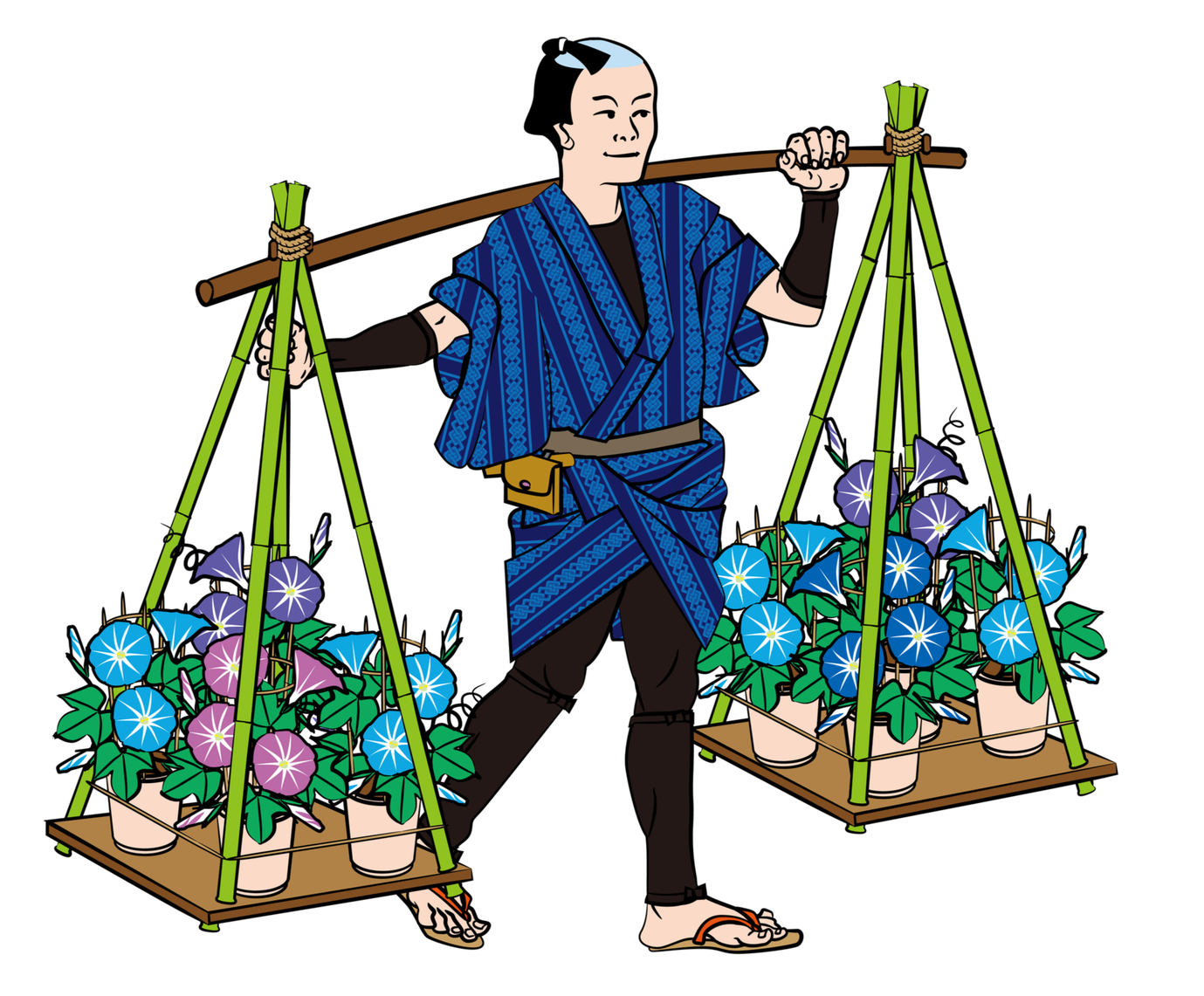
Home for the Homework
The plant in question is an asagao (morning face) in Japanese, morning glory in English. It blooms in the morning, hence the name, and closes for the rest of the day when the sun is getting too much for it. Hana planted and nurtured it herself in school and continuing care is one of her homework assignments. While the rest of the free world is rightfully discussing the abolishment of the unproven concept of homework, in Japan students even get assignments over the holidays.
So, her first summer vacation was spent watering, trimming and spraying her asagao while recording the process; daily reading aloud from her textbook; preparing a presentation on a topic of her own choosing; and keeping a diary of all the things she did with her free time. I was relieved she occasionally found something besides “I’ve been doing my damn homework!” to write in there.
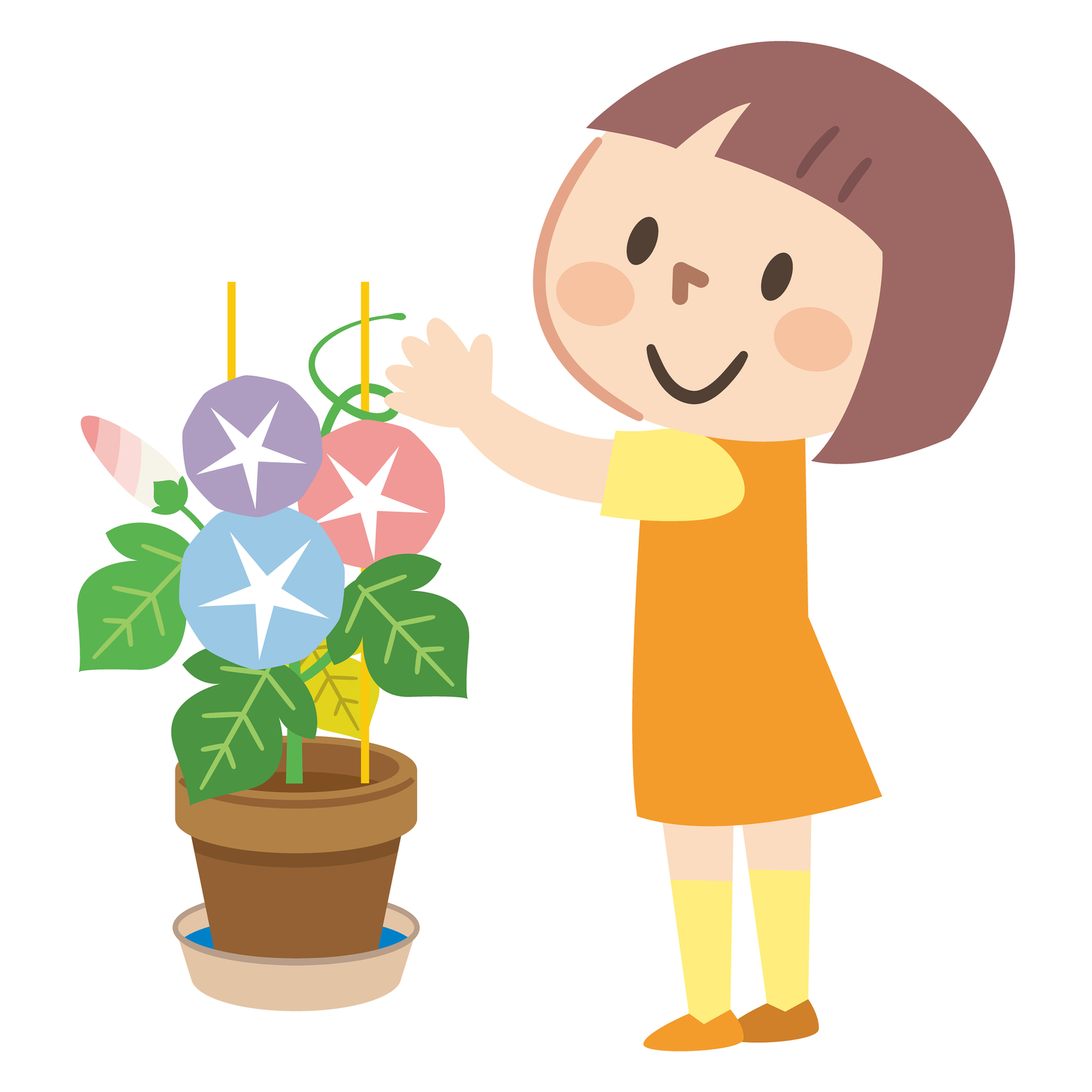
The reading tasks she made fun for herself and others by rapping the lines. She found her flow quite naturally, which surprised us. Neither my wife nor I have anything against hip hop, but it is hardly a fixture in our house. My wife is more of the R’n’B persuasion; I come from a rock background. (I do own a couple of Ice-T albums, yet for hopefully obvious reasons, I don’t play them when my 7-year-old is around).
For her presentation, she chose the colors of the rainbow and their international perception. While everybody around the world sees the same kind of rainbow, the color range is interpreted differently. The Baiga tribe, for instance, perceives only two colors when rain reflects sunlight. In Japan, it’s seven – two more than in my home country of Germany. No, I wouldn’t know any of this either if Hana didn’t talk about it without end.

While all of this is very interesting, it is the new life growing on our balcony that intrigues me most.
Starting to Care
I am by no means a habitual plant lover. Never cared much for them. I had a very brief cactus phase in my youth, probably because I found their spikiness delightfully contrarian, but mainly because they were the least demanding species of greenery on the market.
I had just proven again that I have no way with plants a few weeks earlier. It was another school project. Hana brought home a small flower which we parents were supposed to transfer to a bigger container. It didn’t sound too complicated, so I took it on. My wife suggested buying a medium-sized pot and some additional soil at the 100-yen store close to our house. Instead, I did the manly thing. I took the bus to the next Aeon Style, where I bought pretty much the entire gardening department. Gloves, shovels, fertilizers and several items I am yet to research what exactly they are for.

The flower didn’t survive and I didn’t feel like obtaining a new hobby anymore.
The Cult of Asagao
But with Asa-chan it’s different. I can’t wait to get up in the morning, check the number of flowers, note their colors (there are blue, pink, and violet variations) and harvest the seeds to ensure survival of the species. So, when Hana asks me to take over because she has an important playground appointment, I won’t bark: “I’m not doing your homework for you, young lady!” Instead, I’ll gush: “Of course! With pleasure! Thank you for your trust! I won’t fail you this time.”
When the typhoon season brought strong winds and heavy rain, I took Asa-chan inside, and it got us even closer together. In fact, she bloomed much longer on those indoor days, protected from that blazing sun out there, our mutual enemy.

It’s no wonder Hana’s school chose this particular specimen as their subject. If you open your heart to the asagao, your eyes will see it everywhere. In front of every house, looming over every balcony, snapped by every smartphone and shared on every social media account. In our neighborhood, they often grow in the tale-tell blue-yellow pots with name tags that ours also came in. That makes it very easy to identify the homes of Hana’s classmates.
Sometimes we wander the streets, stop at an asagao and say: “Look how nicely Sato-kun’s is blooming! Wonder what that kid’s secret is?” Or: “If Suzuki-chan doesn’t spray her plant’s leaves anytime soon, they will be burnt by the end of the day! What kind of parents let this happen?” We can tell by the conditions of their potted plants which kids will be proper company for Hana.
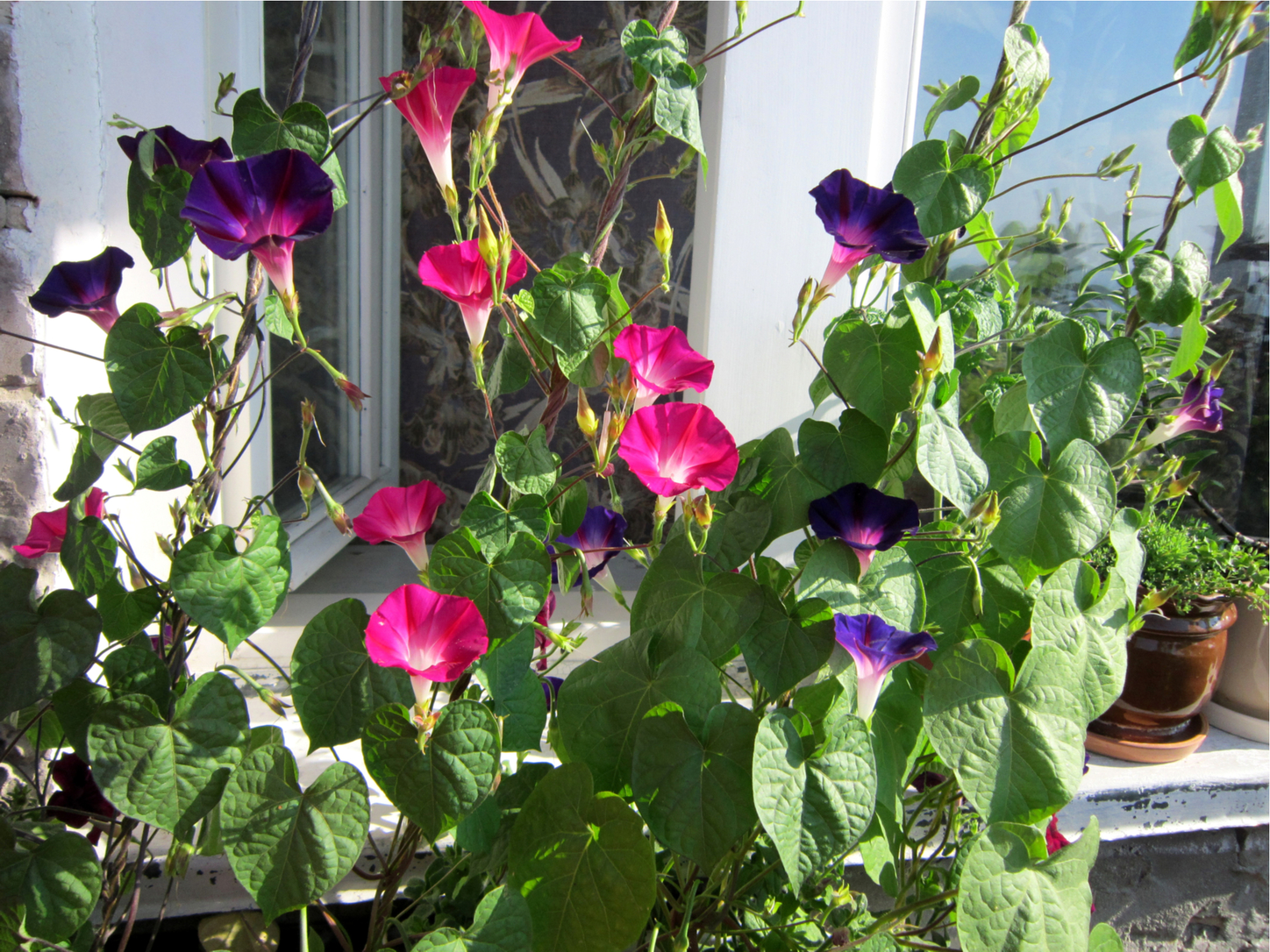
Plant’s not Dead
My heart sank when I opened the curtain one morning and Asa-chan showed no flowers. Had I killed her after all? I was so sure our care regiment had been immaculate. What more could I give? Human blood?
Before I could take that thought any further (we live on a quiet street without many witnesses), the plant made a slow but steady recovery. On the day we finally took it back to school after the summer vacation, it presented a record-breaking 13 flowers. I’m sure it was trying to say: “No! Don’t take me back! Let me stay with you forever! See how beautiful I am!”
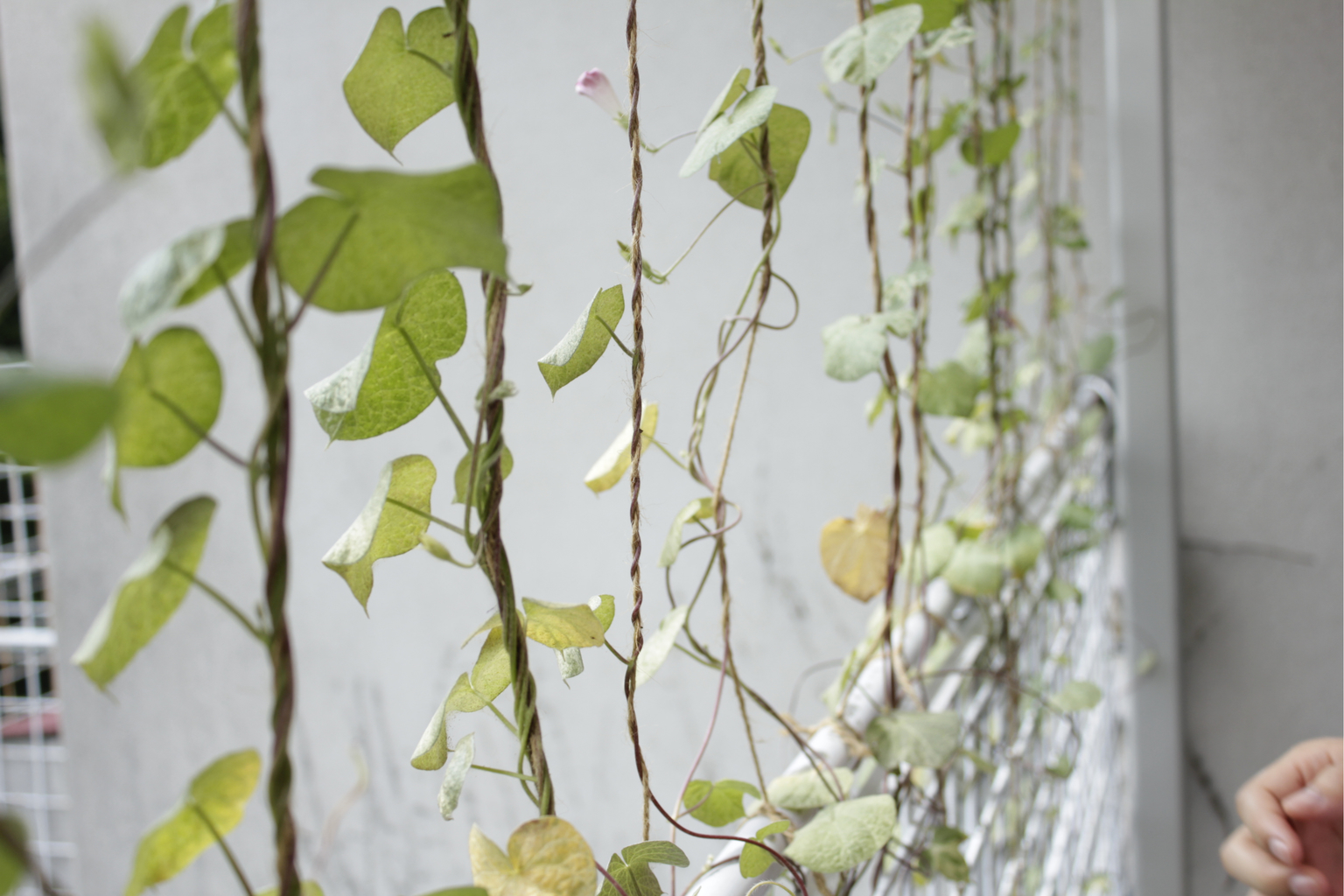
Sending Hana off to school every morning has become a happy routine for me since she likes it there and I know she’ll be back by late afternoon to discuss international rainbow perception. But the asagao? It was like sending her off to a far-away boarding school. When I see her next time, will she still be my same old Asa-chan?
Tokyo Daddy Issues: Learning to Let Go (to Elementary School)
Tokyo Daddy Issues: Shall We Slay Demons or Sith Lords?
Related Posts

Two Charred Bodies Found in Nasu and Japan’s Dual Custody Bill | News Roundup

The 6 Best Retro Onsen and Sento in Tokyo

Snake on a Shinkansen Delays Service by 17 Minutes

The Heart of Aso, Restored: Inside the Rebuilding of Aso Shrine

Tara: A Mystical Oceanside Town Where You Can Feel the Moon’s Power

Super Delivery International: Bringing Japan to Your Door

Stay in Style at DoubleTree by Hilton Kyoto Station

A Culinary Wonderland in Hyogo Prefecture

Summer 2016

- Kids' Korner: Summer Vacation
What do you like doing over summer vacation?
Do you like going to the beach? How about hiking or going to the movies?
If you answered yes to any of these, then you have a lot in common with many children in Japan!
In Japan, as in the U.S., summer vacation is a time to have fun and enjoy the warm weather, spend time with friends and family, or go on vacation; but, unlike in the U.S., where students usually get two to three months of vacation time, Japanese students generally only receive five weeks off from school.
In addition to having less time off, Japanese students are also expected to complete a number of assignments over their summer vacation . Such assignments can include things like writing a daily diary entry, reading books and writing short reports, and independent science projects, all of which students turn in to their teachers when they go back to school.
The reason why teachers can assign their students summer homework is because their vacation falls in the middle of the Japanese school year, instead of between grades. This also means that students often go to school over their break to participate in activities like clubs and sports.
Many children go to summer camps as well. Some of the most popular kinds of summer camps are rural retreats where children can get a taste of what it is like to live in the countryside. Most Japanese live in cities, so it can be very exciting to experience things like camping, hiking in the woods, horseback riding, fishing, or even working on a farm.
There are also many summer festivals that offer fun diversions for the whole family. Especially fireworks !
So, what are you going to do this summer?
Banner Photo: Children in Summertime
© JNTO
- Consulate Homepage
- Japan Information Center
- Japan Info
- Summer 2016
Japan Info is a publication of the Consulate General of Japan in New York. However, the opinions and materials contained herein do not necessarily represent the views or policies of the Government of Japan.
TEL: (212) 371-8222

- Subscribe to Our Newsletter
- Send Us Your Feedback
- Legal Matters •
- About Accessibility •
- Privacy Policy
Tell us more about yourself: Take our user survey now!
Been There, Learnt That: When Vacations Involve Homework
Taking the kids home for summer and dealing with assignments.

As kids head back to school, sighs of parental relief can be heard all across Japan. If your kids are in international school, they are probably excited about starting a brand new term. But if they are in a Japanese school, however, you sent them back for the second term with the pile of homework that schools assign over summer break.
Things vary among schools, grades and even teachers, but your typical Japanese elementary school student has to complete pages of kanji and math drills, book reports, a diary of what they did and, of course, the ubiquitous jiyu kenkyu , or “summer project.”
Japanese schools’ summer project assignments

Choosing a project can be a source of stress for parents and kids alike. As the vacation approaches, Japanese parenting magazines often have articles with suggestions, and home centers sell “project kits.” The best kind of project is something that is fun, educational and age-appropriate. Corin, an Australian mom of three, thinks they hit the trifecta with her daughter’s second-grade project this year.
“She is interested in nutrition, so she made a bilingual healthy food pyramid. She looked up some ideas for the pyramid online, and adapted one for herself. Then she wrote about it in Japanese on one side and in English on the other.” The final fun touch was adding cute food-shaped erasers from the ¥100 shop for a three-dimensional look. “Science, nutrition, art — it ticked all the boxes and it took her three days,” says Corin.
Our junior high school assigned the usual kanji and math drills, but on top of that, every subject teacher demanded some kind of summer project from the kids. For seventh grade home economics class, they had to plan, make and photograph a bento for a family member. For eighth grade art class, they had to go to an art museum of their choice and write a report about an exhibit. As you can imagine, however, some of the other projects were more painful.
Like many foreign mothers, I used to take my kids home each summer vacation. We typically flew out a day or two before the official end of the Japanese term, to take advantage of cheaper airfares. When my oldest was in seventh grade, I told his homeroom teacher of our plans and asked if we could get the summer homework packet one day early. The teacher indignantly informed me that homework packets are given out on the last day of class — and no sooner!
True to his word, the homeroom teacher did send out the packet to us by courier. My husband was traveling a lot for his work and by the time he was able to connect with the courier company, the summer vacation was more than half over. My husband ended up faxing the assignment sheets to my parent’s home for us.
Summer abroad … isn’t always about relaxation

If you’re fortunate enough to have the means and time to take your kids back to your home country for the summer, you know it isn’t just a case of showing up at grandma’s and relaxing for a month or so. Let’s face it — kids think it’s all about them and it can be hard when they’re removed from their familiar surroundings, friends and activities.
Grandparents, on the other hand, suddenly have their daily routines turned upside down by active little people. No matter how much they love their grandchildren, it can be stressful on both sides. And there you are, stuck in the middle and trying to appease everyone. I remember one vacation when my trio were bickering and yelling, and my mother just lost it. “You three are the most selfish kids I have ever met!” she yelled.
In our case, the solution was to send the kids to the local school for a month each time. Kiwis have an advantage in this respect, as we go home to winter when school is in session. Luckily, the local public school was totally on board with the idea, with the only stipulation being that our kids could communicate in English and that they would go for at least a month. Each of my kids began attending from age five, and my son went all the way through to age 12. It gave my kids structure to their day, their academic English got a huge boost and they learned about their mother’s culture. And Nana and Grandpa (and Mom!) got a bit of a break during the day.
Back home in Japan … and back to business

If you’re like me, coming back to Japan after an extended visit home is bittersweet. On the one hand, there is a sense of relief. It’s your house again, and you set the rules. However, you are now back to your routine — and yep… that includes the Japanese holiday homework!
Every year we went to New Zealand with the best of intentions about doing the homework, but it invariably got shelved until we came back to Japan, with a mad rush the last week to finish it. For the jiyu kenkyu project, my kids always found a way to tie it to their New Zealand experiences. In first and second grade, a photo file about daily life at a New Zealand school with simple captions was enough. As they got older, detailed reports on New Zealand wildlife or Maori culture were some of the ideas they worked on.
Some projects took on a life of their own. When my son was 10, he decided he wanted to “make a wooden ship” while visiting my parents. My father is a DIY kind of guy, so he enthusiastically offered his help. Most days, as soon as my son came home from school, Grandpa and grandson would disappear into the garage and work on the ship. It went through a few design changes and my son heard a few new vocabulary items when he inadvertently dropped a heavy tool on Grandpa’s foot. But it was a great bonding process for both. My son is a college senior now but the ship still sits on the bookshelf in his room.
But summers often bring unexpected surprises, too — which in itself is a way to learn new things. A friend of mine, Amanda, who took her two elementary-aged kids back to the U.S. for the summer, knows that well. Her son worked on a diorama for his project, and a lot of time, effort and materials went into its creation. When it was time to return to Japan, Amanda made a shocking discovery.
“ On the way to the airport, we realized we forgot the diorama! It was in a big square shoebox so we were going to carry it by hand. It was sitting by the front door all ready to go!” She ended up having to ask her parents to FedEx the item over, to the tune of US$170 dollars.
“Most expensive summer project ever!” Amanda says ruefully.
“ Been There, Learnt That ” is a monthly column in which Louise George Kittaka discusses various issues she went through when raising her three children in Japan. If you have any questions for Louise on a topic related to raising bicultural children in or out of Japan, send us an email at [email protected] or leave us a comment. Louise will answer your questions in her next article.
Leave a Reply Cancel reply
Your email address will not be published. Required fields are marked *
Save my name, email, and website in this browser for the next time I comment.
This site is protected by reCAPTCHA and the Google Privacy Policy and Terms of Service apply.
This Week(End)
This week: tokyo area events for april 22 – 28, 2024.

How You Hanami
Savvy tokyo’s sakura reel contest 2024.
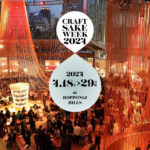
Sip And Sake
Craft sake week 2024.

Tokyo Broadway
Chicago the musical.
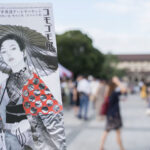
Celebrating Artists
Komogomo exhibition and art market.

Acceptance and Inclusion
Buddy walk tokyo 2024, 50 ways to see, feel and taste tokyo.

Your Guide To The Best Things To Do In Tokyo!
Other articles by louise.

Tokyo’s Top Choices for Autumn & Halloween Afternoon Teas 2022

Kate Kamoshita of Learning Compass

Girls’ Weekend in Dogo Onsen, Matsuyama

On Cloud Nine: Living the High Life with Cé La Vi Tokyo

Cooking Up A Storm With Junior Chef Kiara
Contribute To Savvy Tokyo
Share your voice with savvy tokyo’s readers.
@savvytokyo What convenient apps do you use living in Tokyo?💧📲 #mymizu #freewater #lifeintokyo #lifeinjapan #ecofriendly ♬ やってみよう - WANIMA
Related Articles You Might Like

The Ins & Outs of Japanese Elementary School Holidays
All work and no play? Perhaps, this is the typical image many of us have of the way Japanese kids spend their summer holiday vacations...
By Kirsty Kawano
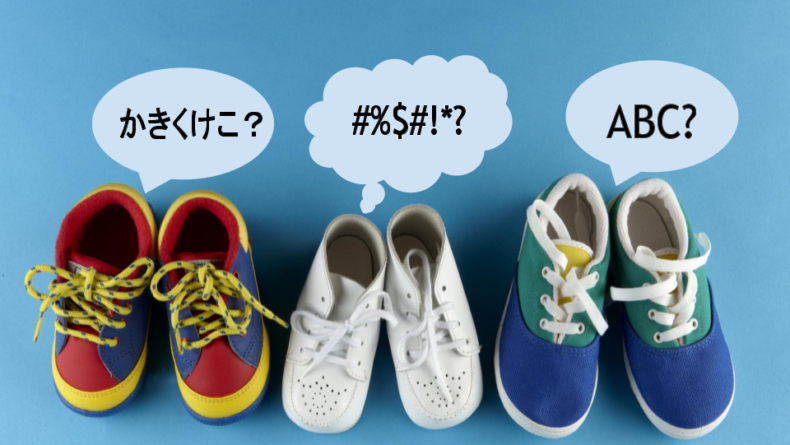
Been There, Learnt That: Raising Bilingual Children In Japan
What do you do when the option of sending your kids to an international school is non-existent and none of the recommended language development approaches...
By Louise George Kittaka
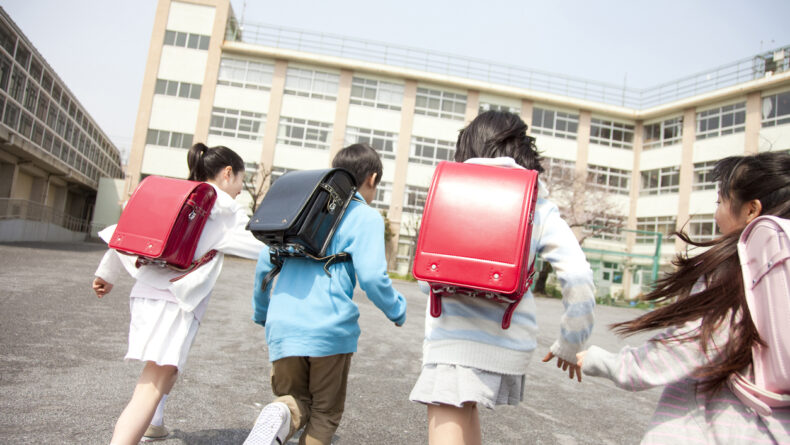
Is A Japanese School Best for Your Child?
What is best for my child? It’s an age-old question, and one that is sometimes easy to answer but often very difficult. When the topic...

Choosing an International School for Your Child
Japan is undergoing a rapid globalization of its education, and international schools are at the forefront of this change. The Tokyo area has some of...
By Mia Moranza
SoraNews24 -Japan News-
Bringing you yesterday's news from Japan and Asia, today.
RocketNews24 Japanese
- TOP » Japan
- » A case of culture shock: Japanese summer vacation isn’t much of a vacation at all
- Studio Ghibli
A case of culture shock: Japanese summer vacation isn’t much of a vacation at all

Our Japanese-language reporter had his world turned upside down when his German wife commented on his childhood memories.
Our Japanese-language reporter Daichiro Tashiro is quite the catch. Not only is he a walking encyclopedia of Disney tidbits and trivia , but he’s a talented and evocative fan artist when he needs to be.
▼ And look at that thousand-megawatt smile!
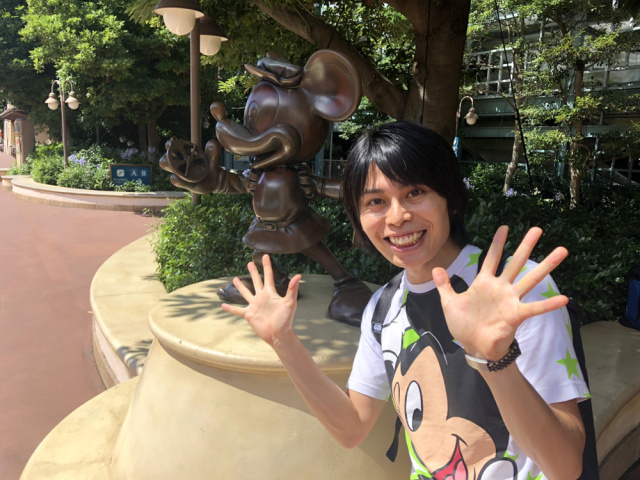
We’re sorry to break any hopeful readers’ hearts, but Daiichiro is happily married to his long-time girlfriend of six years. Throughout their time together they’ve encountered their fair share of cultural misunderstandings ; while Daiichiro is Japanese, his wife is German, and naturally grew up in a very different societies with different customs and social expectations.
Daiichiro admits that most of these cultural differences only amount to a ‘ huh, wow ‘ on the shock scale. Now and again, though, the two of them will come up across such a stumbling block it causes Daiichiro to reevaluate his entire existence.
The day that shattered Daiichiro’s concept of ‘summer vacation’ was, fittingly enough, a piping hot one in the peak of summer. As the cicadas droned noisily in the background, Daiichiro and his wife strolled through the aisles of a supermarket as couples tend to do. When his eyes landed on a counter for “ Summer Vacation Free Study Kits” , packaged experiments or tasks that children can do on a topic of their choice, Daiichiro sighed in nostalgia for his own childhood vacations. Those days were so far away now. So long ago.
“Man, I remember back when I did my free studies in summer vacation,” he told his wife, who hastened to his side, basket in tow.
“Hmm? What are these?”
▼ The possibilities for study are only limited by how many notebooks you have.
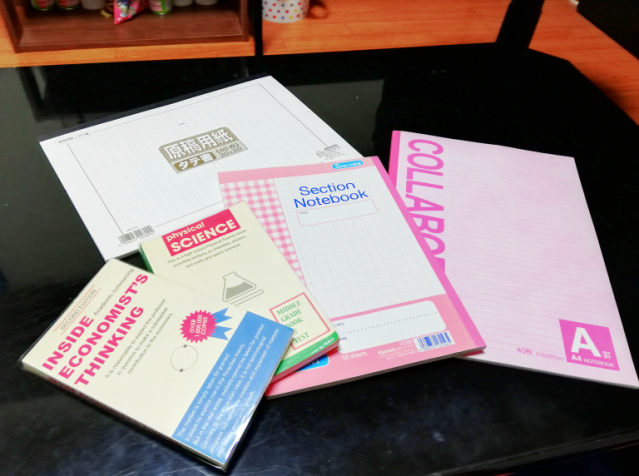
As Daiichiro’s wife blinked at the study kits, Daiichiro took it upon himself to explain the great trials and tribulations of his nation’s children as though he were their spokesman. He told her of the self-imposed studies he and his classmates would undertake, the difficulties, and presumably the inevitable panic that comes from putting all your study off until you barely have any vacation left.
Far from being impressed at his tales from the summer vacation trenches, his usually smiling wife had a look of utter disbelief on her face.
“So…in Japan you do assignments on your summer vacation? That’s not really a vacation then, is it?”
Just like that, Daichiro’s world fell apart.
▼ Dramatic reenactment of the inside of Daiichiro’s head
Not over reacting at all 🐶 🐱 #Nichijou pic.twitter.com/X3PbLzsAbL — DAILY DOSE OF ANIME (@DailyDoseAnime) December 20, 2016
What? What was his dear wife saying? He couldn’t comprehend it. Of course summer vacation is a vacation, he thought, that’s the whole point of it! It’s a vacation! Vacation, as in “an extended period of leisure and recreation” . Wait. Wait, wait.
If he, like so many Japanese children, spent his summer vacations doing work…
Then that voided the definition! He had, in fact, done the EXACT opposite of leisure: work! The exact opposite of recreation: labor! While he should have been roaming his tiny childhood world with careless abandon, free as a bird, he had been writing daily diary entries and then relishing the freedom to pick a topic to do more work on, like some kind of sick, ironic joke!

“So,” he croaked to his wife, still shaking from this mind-blowing revelation, “does that mean in Germany…you don’t do any assignments over the summer? None at all?”
“Of course not,” his wife replied at once. “Why would we? It’s summer vacation. Summer vacation .”
Daiichiro had to concede that she had a point.
Then he realized something else. Wasn’t it just a generally accepted fact that Japanese people can’t stop thinking about work, even on their extremely rare days off? Well, how could anyone be expected to switch into relaxation mode after spending their childhood holidays focused on working? You would forget relaxation mode was even an option.
No wonder so many people in Japan struggle with stress management and leaving the office on time.
Daiichiro was lucky enough to experience the decadence of a no-holds barred relaxation fest when visiting a summer resort with his wife’s German family, but he implores others to think about this cultural fixture. While it’s true that doing assignments over summer holiday keeps kids’ brain cells active and encourages a strong work ethic, it might also damage their ability to ever take a break.
Make no mistake though, in general our happy-go-lucky reporter loves having the opportunity to discuss these quirks and differences with his wife . Thankfully, he’s well past the age where he’d be expected to take daily notes on those differences and write up a report on it.
Images © SoraNews24 ● Want to hear about SoraNews24’s latest articles as soon as they’re published? Follow us on Facebook and Twitter ! [ Read in Japanese ]
- ( COK • cultural differences • Daiichiro Tashiro • international relationships • internationalism • relationships • romance • schools • SNJO • society • summer vacation )
Related Stories

- Japan’s new mayonnaise ice cream doesn’t taste like you’d expect【Taste test】
- Why this American can’t stand Japanese bookstores
- Comments ( )
- Trackbacks (0)
Leave a Reply
- There are no trackbacks yet.
- Trackback URL
Trending Now
- Secret Kitchen bento serves Japanese flowers, birds, wind and moon in a box, but is it worth it? 14 views
- McDonald’s new Happy Meals offer up cute and practical Sanrio lifestyle goods 13 views
- French Fries Bread in Tokyo’s Shibuya becomes a hit on social media 9 views
- Non-ramen Ramen Restaurant Stars: The quest begins at Tokyo’s Oreryu Shio 3 views
- All-you-can-drink Starbucks and amazing views part of Tokyo’s new 170 meter-high sky lounge 3 views
- Family Mart makes matcha dreams come true with new lineup of strong green tea sweets in Japan 3 views
- McDonald’s Japan releases a pancake pie for new retro kissaten coffeeshop series 2 views
- Beautiful Ghibli sealing wax kits let you create accessories and elegant letter decorations【Pics】 2 views
- Super Nintendo World expansion gets delayed for several months at Universal Studios Japan 2 views
- Katsudon vs. tonkatsu vs. katsu sandwich – What’s the best way to eat pork cutlet in Japan? 2 views
MOST POPULAR

RECOMMENDED STORIES

- 訪日外国人向けインバウンド広告メディア「SoraNews24」とは?
Follow SoraNews24
© SoraNews24 -Japan News- / SOCIO CORPORATION
- Advertise |
- Work with us |
- Contribution |

For many children, the long summer vacation is the best time of the year. Summer vacation means trips to the beach, going to the pool, picnics, ice creams and sunshine.
Unfortunately, in some countries, summer vacation also means summer homework.
Nifty Corporation asked just under 1,400 elementary and junior high school students in Japan about summer vacation — and found that a total of 49% thought that summer homework was "necessary" or "somewhat necessary."
However, while just 47% of elementary students thought summer homework was "necessary" or "somewhat necessary," that figure increased to 54% among junior high students. This could be because junior high students are thinking about their future high school entrance exams.
When asked about last year's summer homework, 28% admitted that they had left it until the last minute. However, 47% said they planned to finish their homework at the beginning of the vacation this year, while 28% said they would do a little bit every day.
Only 4% thought that they would leave it until the last minute this year.
When asked what summer homework they most hated, the children's top answers were book reports, workbooks and worksheets, and free research.
Despite all the homework, 63% of children said they felt happy when they thought about summer vacation, and 24% said they felt somewhat happy.
And when asked what they were most looking forward to this summer, the most popular answer was "taking a trip" at 23%. "Fan activities" for favorite entertainers or anime characters was the second most popular answer at 16%, and 11% said they were most looking forward to "meeting relatives."
This lesson is based on an article by Michael Lambe.

Japanese Children Staying Online Until Later at Night

Polish Children No Longer Have to Do Homework

Recess or Break? US vs. UK School Vocabulary

For many children, the long summer vacation is the best time of the year. Summer vacation means trips to the beach, going to the pool, picnics, ice creams and sunshine.
Unfortunately, in some countries, summer vacation also means summer homework.
Nifty Corporation asked just under 1,400 elementary and junior high school students in Japan about summer vacation — and found that a total of 49% thought that summer homework was "necessary" or "somewhat necessary."
However, while just 47% of elementary students thought summer homework was "necessary" or "somewhat necessary," that figure increased to 54% among junior high students. This could be because junior high students are thinking about their future high school entrance exams.
When asked about last year's summer homework, 28% admitted that they had left it until the last minute. However, 47% said they planned to finish their homework at the beginning of the vacation this year, while 28% said they would do a little bit every day.
Only 4% thought that they would leave it until the last minute this year.
When asked what summer homework they most hated, the children's top answers were book reports, workbooks and worksheets, and free research.
Despite all the homework, 63% of children said they felt happy when they thought about summer vacation, and 24% said they felt somewhat happy.
And when asked what they were most looking forward to this summer, the most popular answer was "taking a trip" at 23%. "Fan activities" for favorite entertainers or anime characters was the second most popular answer at 16%, and 11% said they were most looking forward to "meeting relatives."
多くの子どもたちにとって、長い夏休みは一年で1番楽しい時期だ。 夏休みといえば、ビーチやプールに行くこと、さらにはピクニックやアイスクリーム、太陽の光だ。
残念なことに、国によっては、夏休みは夏休みの宿題というところもある。
ニフティ株式会社が日本の小中学生1,400人弱に夏休みについて尋ねたところ、夏休みの宿題は「必要」または「どちらかと言えば必要」だと思う人が合計で49%いることがわかった。
しかし、夏休みの宿題は「必要」または「どちらかと言えば必要」だと思う小学生がわずか47%だったのに対し、中学生ではその数が54%に増えた。 これは、中学生が今後の高校受験を意識しているからかもしれない。
昨年の夏休みの宿題について尋ねると、28%がギリギリまで残してしまったことを認めた。 しかし、今年は47%が休みの最初の方に終わらせるつもりだと答え、28%は毎日少しずつやると答えた。
今年、ギリギリで終わらせると答えたのはわずか4%だった。
1番嫌な夏休みの宿題は何かという質問には、読書感想文、問題集やドリル、自由研究という答えが子どもたちの回答で上位を占めた。
宿題が多いにもかかわらず、63%の子どもたちが夏休みのことを考えるとうれしいと答え、24%の子どもたちがどちらかと言えばうれしいと答えた。
また、この夏1番楽しみなことを尋ねたところ、最も多かった回答は「旅行」で23%だった。 好きな芸能人やアニメキャラクターの「推し活」が16%で2番目に多く、「親せきに会うこと」が1番楽しみなのは11%だった。
Michael Lambeによる記事。

Tidbits Japan
Insightful stories about japanese culture and useful information for travelling in japan, how long is the summer break in japanese schools how about spring and winter breaks.
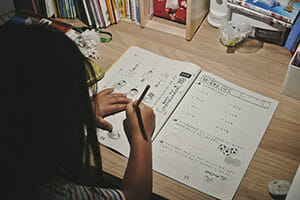
Most elementary, middle and high schools in Japan have about 40 days of summer breaks, usually from July 20 to August 31.
Winter break is normally from December 25 to January 7. Spring break is from March 25 to around April 5. (The school year starts in April.)
School hours’ change toward breaks
One interesting fact is they start to gradually shorten the school hours when a break approaches.
For example, they normally have 6 periods in a day. Length of a school day varies depending on each school, but let’s say the school starts at 8:20 and ends at 3:00 to cover those 6 periods.
From around July 14, they start to have only 4 periods a day. Students eat hot lunch and after cleaning time, they go home at around 1pm.
After a few days of that, they will shorten the day even farther. They will have 3 periods a day and no hot lunch, but a cleaning time.
The final day of the school, which is usually July 19, they will have only 1 or 2 periods.
When the school resumes in September, they will do the opposite.
The first day, they have only 1 or 2 periods. Then, they gradually increase the school hours.
Does it make it difficult for parents?
Not really.
Kids go to school by themselves and come home by themselves.
So, if you are at-home parents, you see them come home early.
If you work outside of home, you would arrange after-school care called “gakudo” which is normally provided in a facility attached to public elementary schools. (Gakudo is very cheap by the way. I used to pay 7,000 yen per month for them to keep my son after school every day. They were open till 7pm.)
When they are older, you’d let your kids stay at home by themselves.
Homework during breaks
kids are given home works to do during breaks.
It will be either a work book on several subjects or tens of handout made by the teacher.
You are supposed to do it little by little everyday to finish it.
Some kids don’t do it everyday and they will end up staying up all night to finish it at the end of summer.
They also give you special assignment such as science project, paper craft, Japanese calligraphy and drawing.
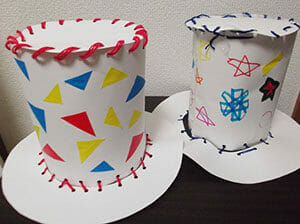
Kids in Japan are busy studying in summer!
Is summer break too short?
Compared to western countries, 40-day summer break seems too short.
But it is considered to be long enough by most of parents.
It is very hot in most places of Japan in July and August. So, you would take your kids to a local library since it has a good air-conditioning. Swimming pools are popular for kids, too. But for parents, it is burning hot to wait for them beside the pool. You get soaked not by immersing yourself in the water, but just by sitting outside. Still, you would take them to those pools a few times a summer. But that would be the maximum.
Working parents don’t get long vacation. Average employees get 5 days of summer holidays and believe it or not, not many people take all of them.
That makes it harder to entertain kids during summer break.
In cities, many parents send kids to Juku, a cram school, every day.
Even if the parents can take their entitled summer break from their employers (which are likely to be big companies), majority of them spend it to visit their parents (kids’ grandparents) in obon. Obon is from August 13 to 15, and people pay homage to their ancestors’ grave.
If they don’t need to do so, they would plan a-week-long trip. Popular destination is Hawaii and domestic sightseeing spots. That would be the highlight of the summer.
So, in the context of Japanese culture, the summer break is not considered short.

Related posts:
- Japanese Calligraphy – The Art of Shodo
Leave a Reply Cancel reply
Your email address will not be published. Required fields are marked *

Please input characters displayed above.
This site uses Akismet to reduce spam. Learn how your comment data is processed .
Created for expats living in Japan
- Living in Japan
Yearly Activities and Events in Japanese Public Schools

In Japanese public elementary schools and junior high schools , there are many activities, for example an entrance ceremony, sports day, class observation day, teacher's home visit and so on. In this article you will learn about Japanese school year and main activities.
Japanese School Year

Japanese school year starts in the beginning of April and ends in the end of March of the following year. A school year is divided into 3 terms (some schools have only 2 terms). Below is a calendar of a school which runs 3 terms. International schools in Japan follow the system of each country.
What kind of school activities do Japanese school children take part?
These are major activities in Japanese elementary schools and junior high schools however, not all schools do them all and depending on the school, the school calendar could be different.
April - July (1st Term)
September - december (2nd term), january - march (3rd term), other school activities:, summer holiday homework for japanese children / students.
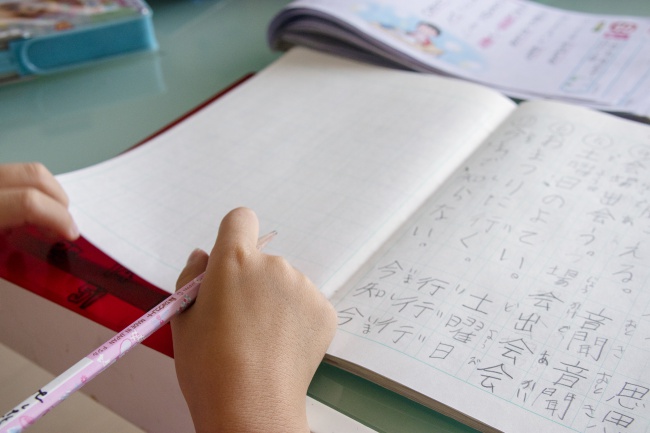
In Japan, summer vacation for students is for about 30-40 days however, children / students have an obligation to finish a lot of homework.
For example, math and kanji (Chinese character) drills, a book report, keeping a journal during the entire summer vacation, a painting, practicing some musical instruments like melodica, an observation report (normally plants), an independent research and so on. Some students go to a summer cram school (known as “juku” or "Kaki-koshu").
Children / students have to submit all of them on the first day of the 2 nd term.
You may also be interested in:
* List of International Schools in Japan
* Japanese education system and which school is the best for your child
* Primary - Elementary School System in Japan
* Enrolling in a Japanese public school and materials you need to prepare
* What You Should Know about Japanese Public School Customs
Related Posts

Homemade Baby Food in Japan
It could be very trying to prepare baby food in Japan if you are not familiar with Japanese weaning system. If you would like to try for homemade baby food, here are 3 useful tips to make your “homemade-baby-food project” much simpler and easier.

Fun Places for Children in Tokyo - Farms, Legoland, Book Stores, Animal Cafes
Looking for fun activities to do or places to go with your children in Tokyo? Here is a list full of places for you to consider when planning a day out with your children.

International Schools in Ibaraki
Introducing schools, kindergarten schools, and pre-schools with curriculum and education of country of origin in mainly an English speaking environment for foreigners in Ibaraki.

International Schools in Hiroshima
List of International Schools in Hiroshima, Japan. Introducing schools, kindergarten schools, and pre-schools with curriculum and education of country of origin in mainly an English speaking environment for foreigners.

International Schools in Osaka
List of International Schools in Osaka, Japan. Introducing schools, kindergarten schools, and pre-schools with curriculum and education of country of origin in mainly an English speaking environment for foreigners.

International Schools in Miyagi
List of International Schools in Miyagi, Japan. Introducing schools, kindergarten schools, and pre-schools with curriculum and education of country of origin in mainly an English speaking environment for foreigners.

Access Ranking

Turn Your iPhone or Android into a Mobile Suica/PASMO IC Card

Omamori: A Guide to Japanese Amulets

English-speaking Nail Salons in Tokyo

Japan Voltage, Frequency, and Plug Type: Guide to Plugging In

Bringing Medication to Japan: What to Know Before You Travel

© 2024 Japan Living Guide. All Rights Reserved.
Everything you want to know about Japan
How long is a summer break in Japan?
Introduction.
Summer break is a highly anticipated time of year for students around the world. In Japan, summer break is a time for relaxation and rejuvenation before the start of a new school year. In this article, we will explore how long the summer break is in Japan, as well as some of the cultural traditions and activities that take place during this time.
History of Summer Break in Japan
The tradition of summer break in Japan dates back to the Meiji era (1868-1912), when the government introduced a system of compulsory education. The school year was structured around the agricultural calendar, with a long summer break to allow students to help with the harvest. Today, the summer break remains an important part of Japanese culture, with many families taking vacations or participating in traditional events.

Duration of Summer Break
Summer break in Japan typically lasts for around six weeks, from late July to early September. The exact dates can vary depending on the region and school, but most schools follow a similar schedule. During this time, students are free from their regular classes and have the opportunity to pursue other interests.
Activities during Summer Break
There are many different activities that take place during summer break in Japan. Some families choose to travel to other parts of the country or even overseas, while others stay closer to home and participate in local festivals and events. Many students also attend summer camps or take classes to learn new skills.
Obon Festival
One of the most important events during summer break in Japan is the Obon festival. This is a time to honor ancestors and loved ones who have passed away. Many families return to their hometowns during this time and participate in traditional rituals such as visiting gravesites and lighting lanterns.
Firework Displays
Another popular tradition during summer break in Japan is watching fireworks displays. These events are held throughout the country and attract large crowds. Many people enjoy dressing up in traditional yukata (summer kimono) and gathering with friends and family to watch the colorful displays.
Beaches and Mountains
With its long coastline and mountainous terrain, Japan offers many opportunities for outdoor activities during summer break. Many families head to the beach to swim and relax, while others go hiking or camping in the mountains. Popular destinations include Hokkaido, Okinawa, and the Japanese Alps.
Summer Festivals
Summer festivals, or matsuri, are a colorful and lively part of Japanese culture. These events feature traditional music, dancing, and food stalls selling local specialties. Some of the most famous festivals include the Gion Matsuri in Kyoto and the Tenjin Matsuri in Osaka.
Summer Food
Summer is a time for enjoying refreshing foods that help beat the heat. Some popular summer dishes in Japan include cold noodles such as soba and udon, as well as shaved ice desserts like kakigori. Grilled meats and vegetables, known as yakiniku, are also a favorite during summer.
Summer Homework
While summer break is a time for relaxation, many students in Japan are still required to complete homework assignments during this time. This includes reading assignments and math problems to help students stay on track academically.
Back-to-School Preparations
As summer break draws to a close, students begin preparing for the start of a new school year. This includes purchasing new uniforms and school supplies, as well as reviewing materials from the previous year. Many schools also hold welcome ceremonies to introduce new students and teachers.
Summer break in Japan is a time for rest, relaxation, and cultural traditions. Whether you are traveling to new places, participating in local festivals, or simply enjoying the outdoors, there are many ways to make the most of this special time of year. While the break may be brief, the memories and experiences will last a lifetime.
What country has the longest summer break?
Italy grants its students the lengthiest summer break, lasting for 13 weeks, which is the longest among all countries. Portugal and Greece come next, with 12 weeks of vacation.
How long is a Japanese school year?
In Japan, the academic year starts in April and ends in March, and is split into three semesters. The first semester begins in April and goes until around July 20, with summer vacation for most students lasting from July 20 to August 31. This is the traditional academic calendar for elementary, junior high, and high schools in Japan.
Does Japan have a 6 day school week?
In Japan, the typical school week runs from Monday to Friday, but some schools also provide optional classes on Saturdays. Due to the emphasis on academic success, many Japanese students opt to attend these classes, making it seem like the school week is extended to six days.
How long is summer break in Korea?
Korean students typically have a summer vacation of only six weeks, from mid-July to late August. However, university students tend to travel throughout the season, keeping trains and buses busy. It is important to book accommodations early in popular destinations like Busan’s beaches, which can become extremely crowded between June and August.
How long is USA summer break?
In the United States, summer break usually lasts for 8-9 weeks and typically begins either in late June through early September or late May through mid-August.
What country has a 6 day school week?
In the developed world, Israel is unique in that children attend school six days a week. This information was reported on November 12, 2019.
COVID-19 Impact on Summer Break in Japan
In recent years, the COVID-19 pandemic has had a significant impact on summer break in Japan. Many traditional events and festivals have been canceled or scaled back to prevent the spread of the virus. Some schools have also implemented online or hybrid learning options, which can make summer break feel less like a break for students who are still required to attend classes.
Future of Summer Break in Japan
Despite the challenges posed by the pandemic, summer break remains an important part of Japanese culture. As the world continues to adapt to the new normal, it is likely that traditional events and festivals will return in full force. However, there may also be changes to the way summer break is structured and how students are able to spend their time off.
Summer break is a cherished time of year in Japan, offering students and families the opportunity to relax and enjoy traditional cultural events. From participating in festivals to exploring the outdoors, there are many ways to make the most of this special time. As we look towards the future, it is clear that summer break will continue to evolve and adapt, but its importance as a time for rest and rejuvenation will remain unchanged.
Related posts:
- How long is summer break in Japan?
- How many hours is full-time in Japan?
- Do Japanese people get Saturday off?
- Do you go to school 6 days a week in Japan?
Leave a Comment Cancel Reply
Your email address will not be published. Required fields are marked *
Save my name, email, and website in this browser for the next time I comment.
Ads Blocker Detected!!!
We have detected that you are using extensions to block ads. Please support us by disabling these ads blocker.
Tag - homework
- Subscribe Digital Print

- Semiconductors
- Latest News
- Deep Dive Podcast
Today's print edition
Home Delivery
- Crime & Legal
- Science & Health
- More sports
- CLIMATE CHANGE
- SUSTAINABILITY
- EARTH SCIENCE
- Food & Drink
- Style & Design
- TV & Streaming
- Entertainment news
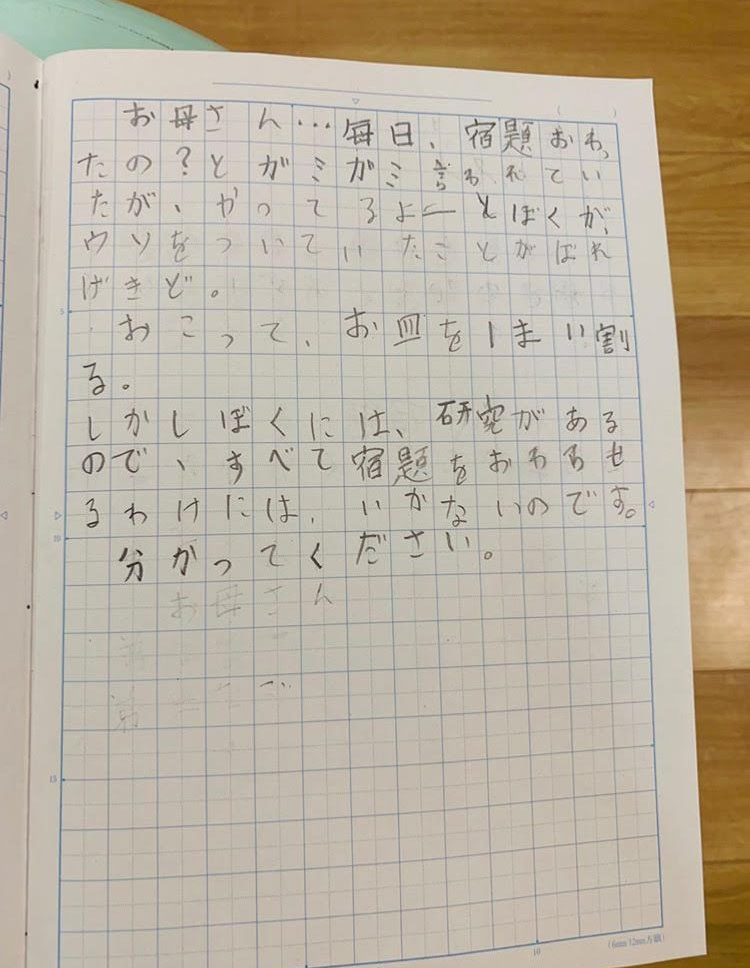
SUSTAINABLE JAPAN

SPECIAL SUPPLEMENTS
Sponsored contents planned and edited by JT Media Enterprise Division.
広告出稿に関するおといあわせはこちらまで
SUPPLEMENTS BINDER

- Bridges by SMS
- Global Insight
- World Eye Reports
- Work With Us
- Blogging Bootcamp

- Van Conversion Academy
- Campervan Shop
- Campervan Rentals
- Plan a Trip
- Itineraries
- Destinations
- Responsible Travel
- Family Travel
- Budget Travel
- Scuba Diving
- Travel Credit Cards
- Digital Nomad
- Teach English Abroad
- Blogging Resources
- Income Reports
- Travel Shop
- Meet Katie & Ben
- About Two Wandering Soles
- Personal Stuff
- Portfolio & Press
Summer in Japan: Ultimate Seasonal Guide
Home » Blog » Japan » Summer in Japan: Ultimate Seasonal Guide
Summertime in Japan is a great time to hit the beach or cool off in the mountains. We’re sharing the best places to visit and things to do during summer in Japan, as well as lots of insider tips for planning your trip!

We’ve traveled to Japan on 3 separate occasions in February, August, and November. And I’m gonna be totally up front about this – summer was not our favorite.
But even though we personally don’t think summer is the best time to visit Japan , this season certainly has its appeal, and it could be perfect for the right person.
Summer in Japan means festivals, lush greenery, open mountain trails, and white-sand beaches with inviting turquoise waters.
That said, there are some important things you need to know in order to prepare for a summer trip to Japan. Keep reading so you know what to expect in terms of temperatures, weather, and the dreaded typhoon season (spoiler alert: it’s probably not as bad as you think!).
Summer in Japan Guide
- When is summer in Japan
- Reasons to visit Japan in summer
Summer weather in Japan
Things to do during summer in japan, best places to visit during summer in japan.
- What to pack for summer in Japan

If you’re planning a trip to Japan, we have the ultimate resource for you!
This FREE PDF download includes everything you’re going to want to pack for your Japan trip, including what NOT to bring, plus tons of insider tips!
Sign up for our ultimate Japan packing list now and get a copy sent straight to your inbox.
When is summer in Japan?
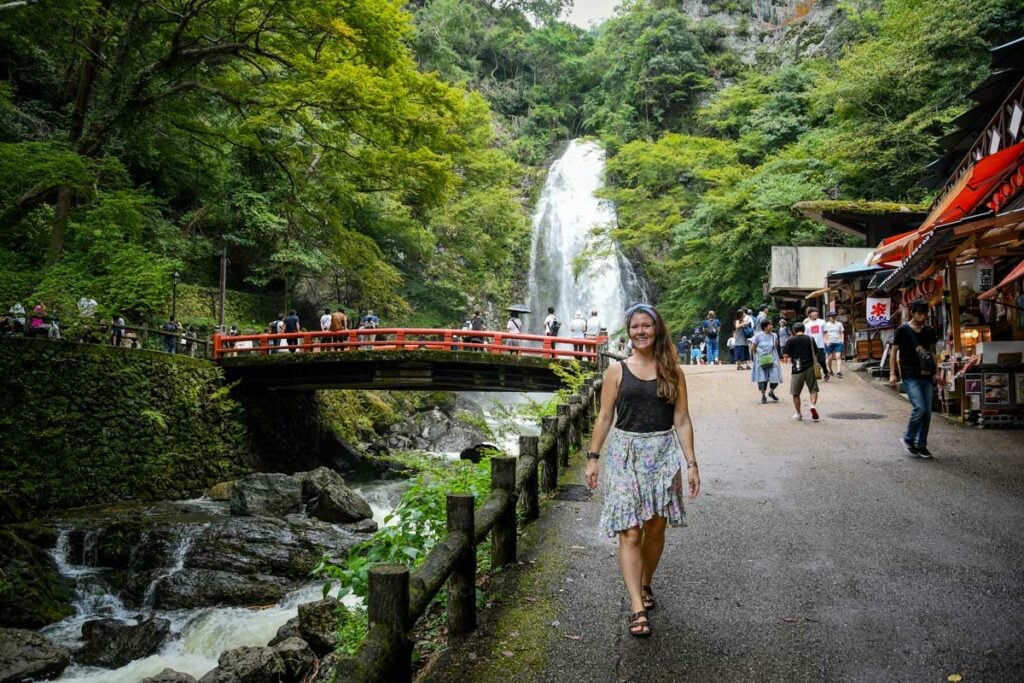
Summer in Japan spans from June to August .
August is the busiest travel month overall because school is out and many Japanese people travel over the Obon holiday (August 13-15). But the absolute busiest time in Japan is during Golden Week in the spring, which you can read about here .
Reasons to visit Japan in summertime?
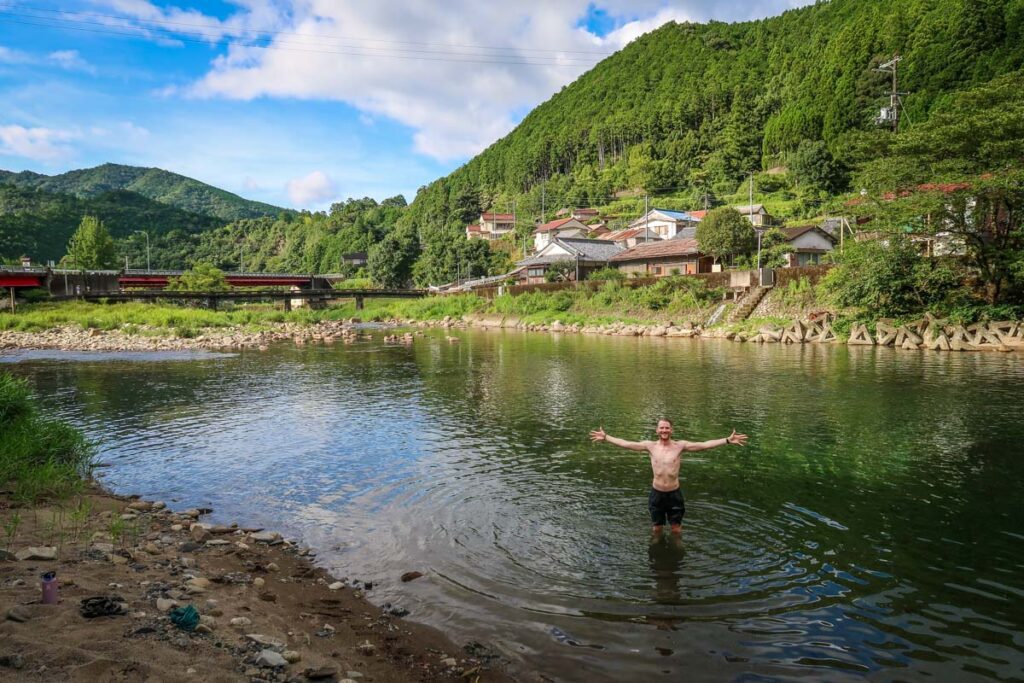
Each of Japan’s four seasons has its own unique draws, and summer is no exception. Here are some of the top reasons to visit Japan in summer:
- Summer is festival season in Japan, with cultural celebrations taking place all across the country.
- This is the prime season for hiking in the mountains , where temperatures remain comfortable in the summer due to the higher altitude. Some popular hiking trails, like Mount Fuji , are only open in the summer months.
- Japan has a surprising number of pristine beaches that beckon on hot summer days.
- Hot days are also perfect for cooling down with seasonal treats like cold soba, kakigōri (Japanese shaved ice), or unique ice cream flavors, such as matcha or black sesame.
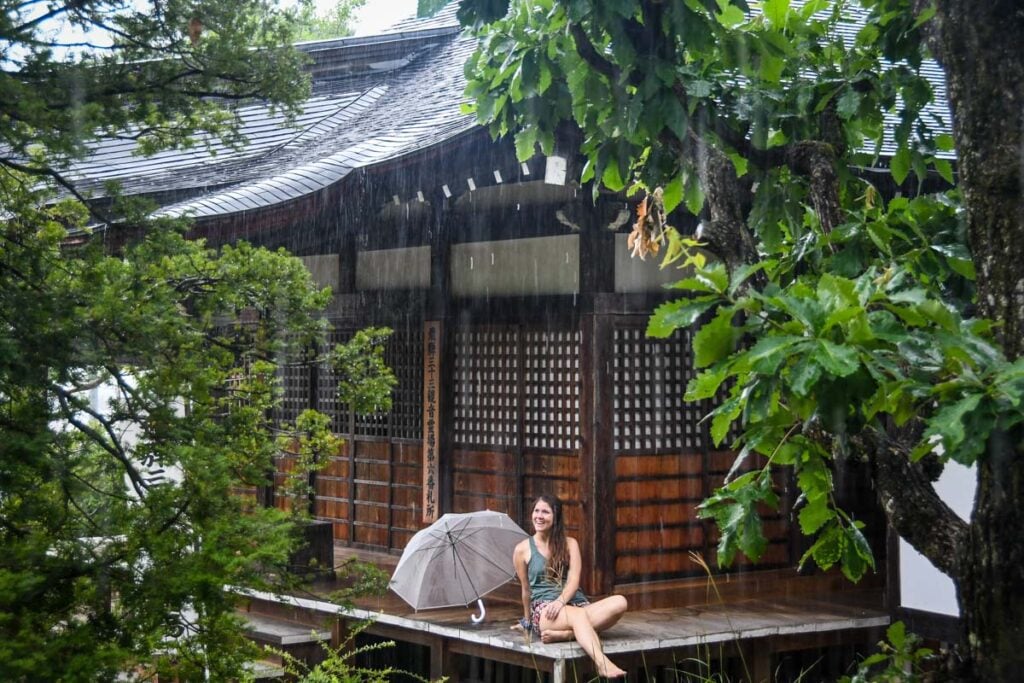
Summer in Japan is known for being hot, humid, sticky, and rainy . We’ve been to Japan in August, and while it wouldn’t be our first choice, we didn’t think it was as bad as everyone makes it out to be.
The beginning of June is quite nice , comparable to the weather in May. However, tsuyu (rainy season) starts around mid-June and lasts for about a month. It doesn’t pour all day, but there is a gloomy June feeling that hangs around. Both temperatures and humidity increase as the month progresses.
July starts out rainy because of tsuyu, but this only lasts until mid-month. Temperatures and humidity continue to rise as this is typically the second hottest month of the year.
August is the hottest month of the year in Japan. Over the last few years, I’ve realized I don’t handle extreme heat very well. I get tired and crabby much more quickly in the heat. Needless to say, I was very nervous about traveling to Japan during August…
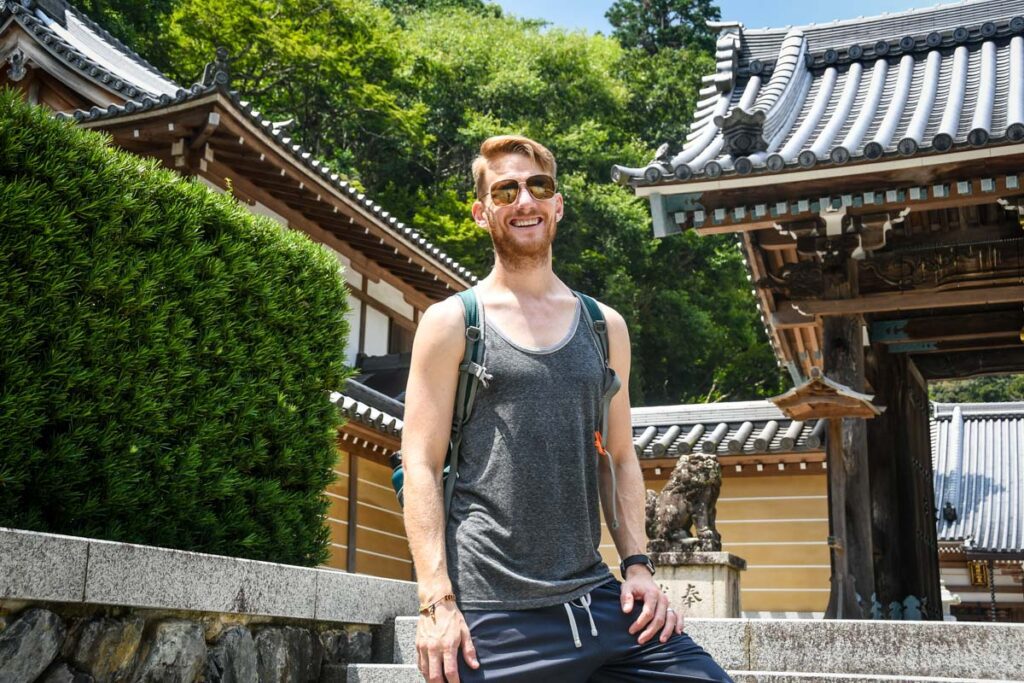
So, what was it like?
Well, it did get pretty hot – like 98°F hot (37°C). And it did rain on us a few times, but typically it would only last for 20-30 minutes and the rain would stop.
Some days were worse than others. After a rain, for example, it was actually pretty comfortable. And all our accommodations (even in tiny villages) had strong AC, so we never had an issue with being comfortable at night.
Knowing what to expect is half the battle, and this way you can prepare yourself for it.
Rainy season in Japan: Early Summer
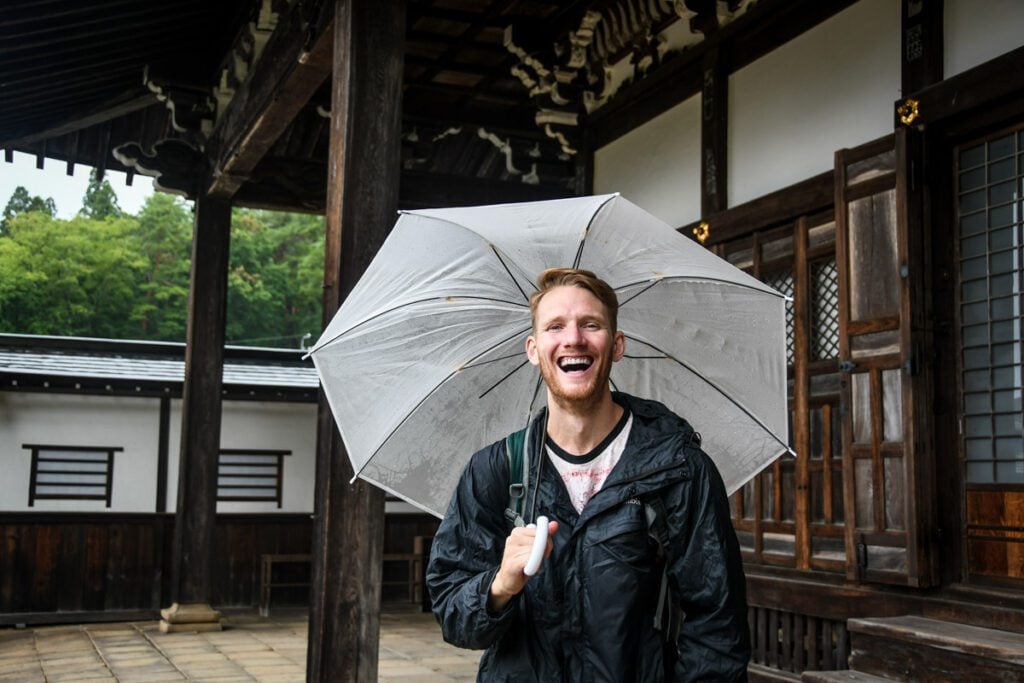
The majority of the country experiences a rainy season from June through mid-July .
The good news is that during the rainy season, there’s a roughly 45% chance of precipitation each day (data from Tokyo), meaning you’ll have some dry days too ! Some of those rainy days will be heavy, while others will be sunny before or after the rain.
You’ll find that life in Japan goes on as usual despite the rain, as locals are used to it. Do as the Japanese do and buy (or pack) an umbrella to stay dry!
Typhoon season in Japan: Late Summer
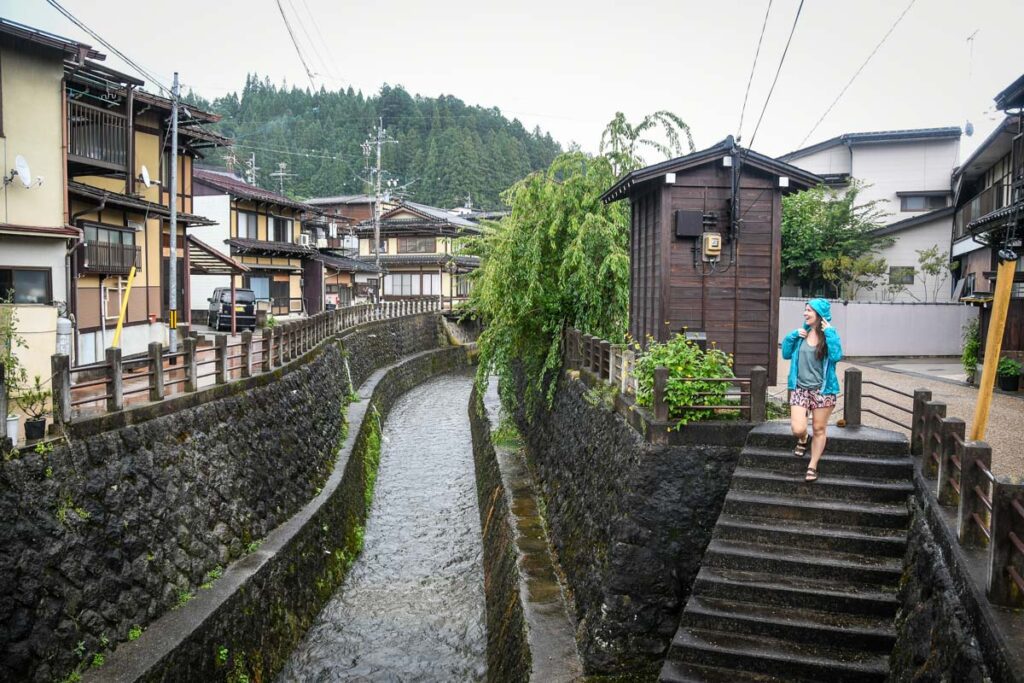
Late May through October is typhoon season in Japan, with the majority of typhoons occurring in August and September . Data from the last 30 years show that an average of 11 typhoons approach the coast per year.
What is a typhoon?
A typhoon is a tropical cyclone. They are formed in the same way a hurricane forms, and the only real difference is the location at which they occur .
What is a typhoon like in Japan?
We visited Japan during the month of August, which as you now know is the peak of typhoon season. And one typhoon made landfall during our visit.
While our typhoon experience in Japan wasn’t super dramatic (we had one night of pounding rain and a food tour canceled on us because restaurants were closing up shop), there have been some catastrophic typhoons in Japan’s history. Therefore, Japanese people take typhoons very seriously.
You should expect heavy rainfall and high winds, canceled and/or delayed trains, and possibly canceled tours. In some cases, it may only interrupt a day or two, and in others it might have longer-lasting effects.
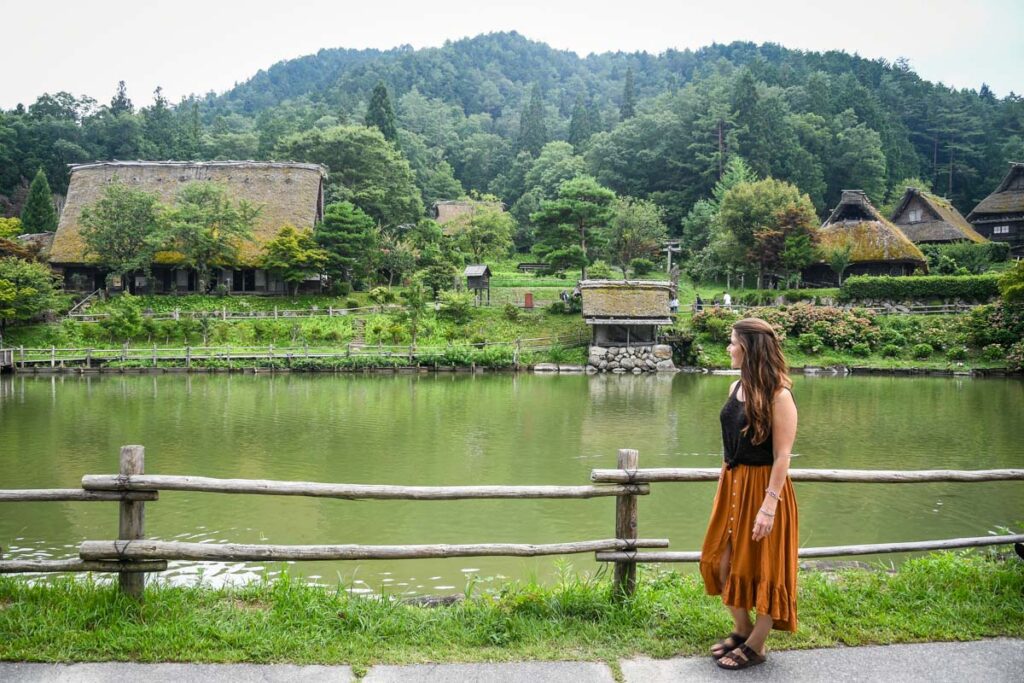
Whether you’re fully embracing the heat, heading to cooler regions, or looking for a quick AC break, there are plenty of things to do in Japan during the summer.
1. Explore teamLab’s digital art museums

Lose yourself in an (indoor + air-conditioned!) immersive art experience where you’re encouraged to kick off your shoes and connect with the installations, blurring the boundaries between art and reality.
The Tokyo-based art collective known as teamLab is famous for creating art installations that are unmatched.
In 2019, we visited teamLab Borderless ( now reopened in a new location !). We loved it so much that when we planned to return to Tokyo in 2023, one of the first things we did was purchase tickets to teamLab PLANETS.
This uber-Instagrammable art experience features crystal “rain”, giant balls that change colors, koi fish that are projected onto water that you walk through, and live orchids that lower down from the ceiling… anyone else reminded of Willy Wonka?!
The experience is hard to sum up in words. So stop thinking about it and just book your tickets already! Speaking of which, this is definitely something you want to purchase in advance as they sell out every day .
Psst! We have tons more ideas for indoor activities in Tokyo you can enjoy on days that are too hot or rainy to be outside. Also, don’t miss our guide to Tokyo at night to take advantage of (slightly) cooler evening temperatures.
2. Soak up the culture at a summer festival
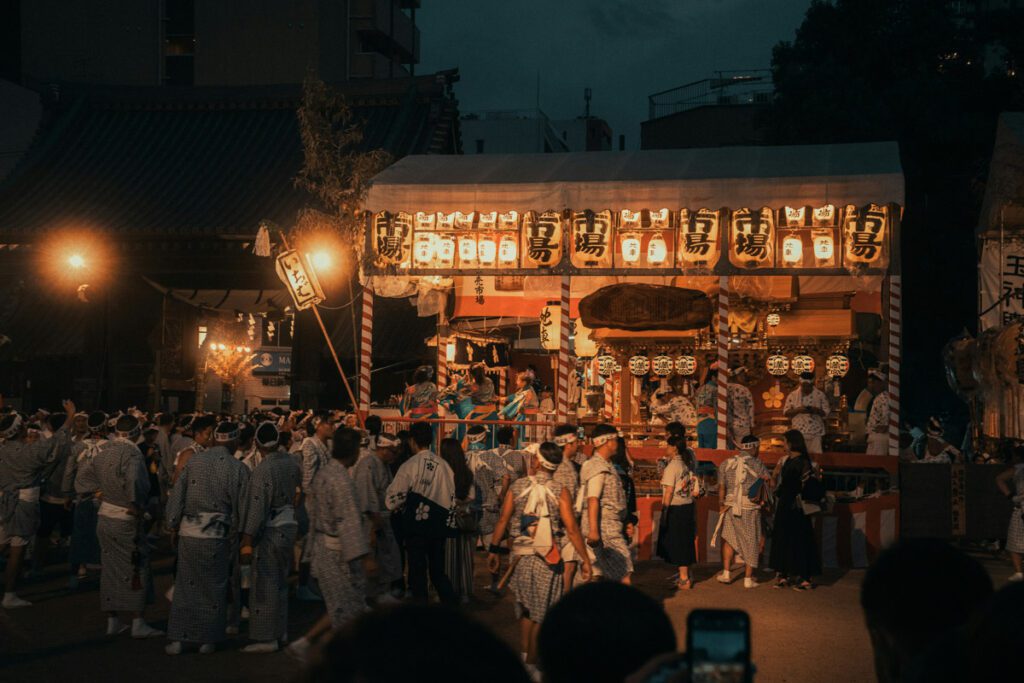
Despite the at-times-oppressive heat and humidity, summer in Japan is buzzing with festivals and cultural celebrations . Here are some of the top festivals ( matsuri ) to check out in the summer months:
- Where: Kyoto
- Where: Osaka
- When: July 24-25
- Where: Sumida, Tokyo
- When: last Saturday in July
- Where: Hiratsuka
3. Traverse the Japanese Alps
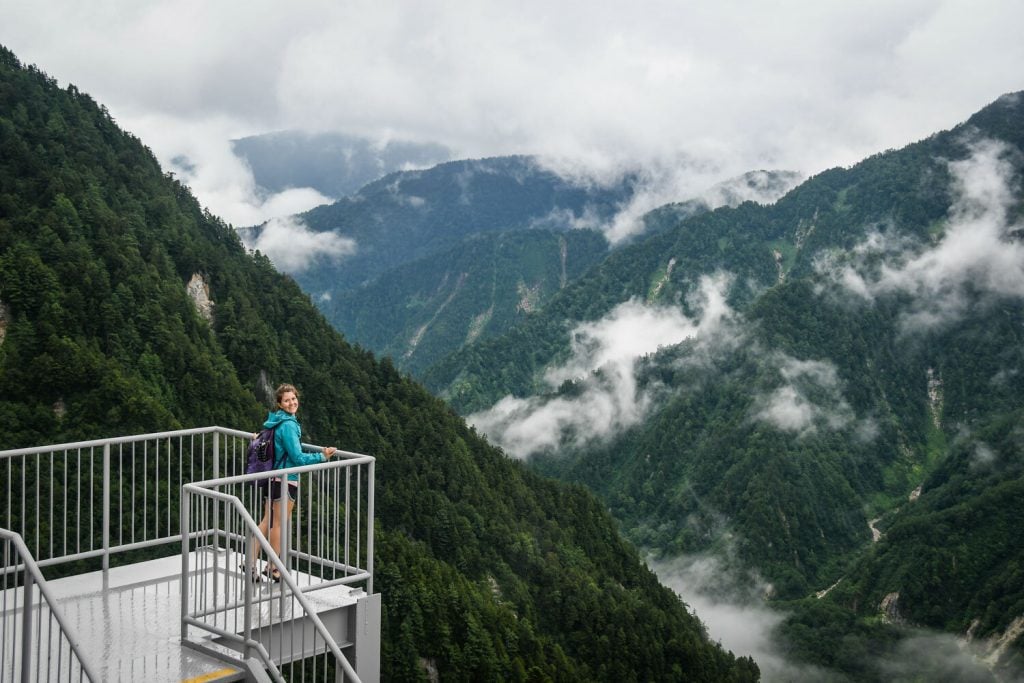
Known as the Roof of Japan , the Tateyama Kurobe Alpine Route is a sightseeing mountain traverse where passengers take 8 different modes of transportation, such as a cable car and a ropeway, from one side of the Kita Japanese Alps to the other.
Travel through lush green valleys and past a few of the highest peaks in Japan . The best part is that summer temperatures high in the mountains are much more comfortable than in the lower-altitude cities.
You can complete the entire route in one day, but if you have extra time (and money) you can stay at the highest hotel in Japan, Hotel Tateyama .
4. Dive into an underwater paradise
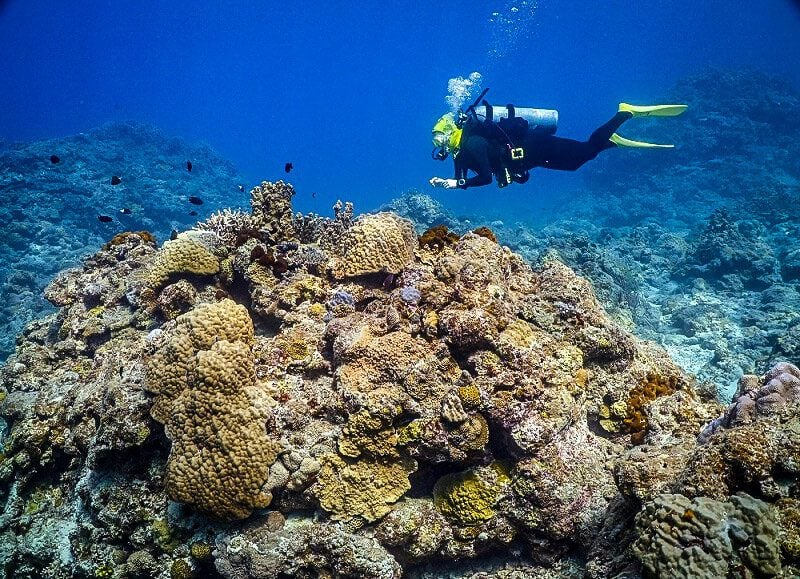
Have you ever considered scuba diving in Japan ?! We hadn’t either… But our friend Corinne has been living and diving in Japan for the past 2 years, and she swears it is a dive location that should be on your radar!
Check out our ultimate guide to diving in Japan for a detailed breakdown of the best dive sites, as well as everything you need to know to plan an unforgettable diving trip.
5. Head to the beach
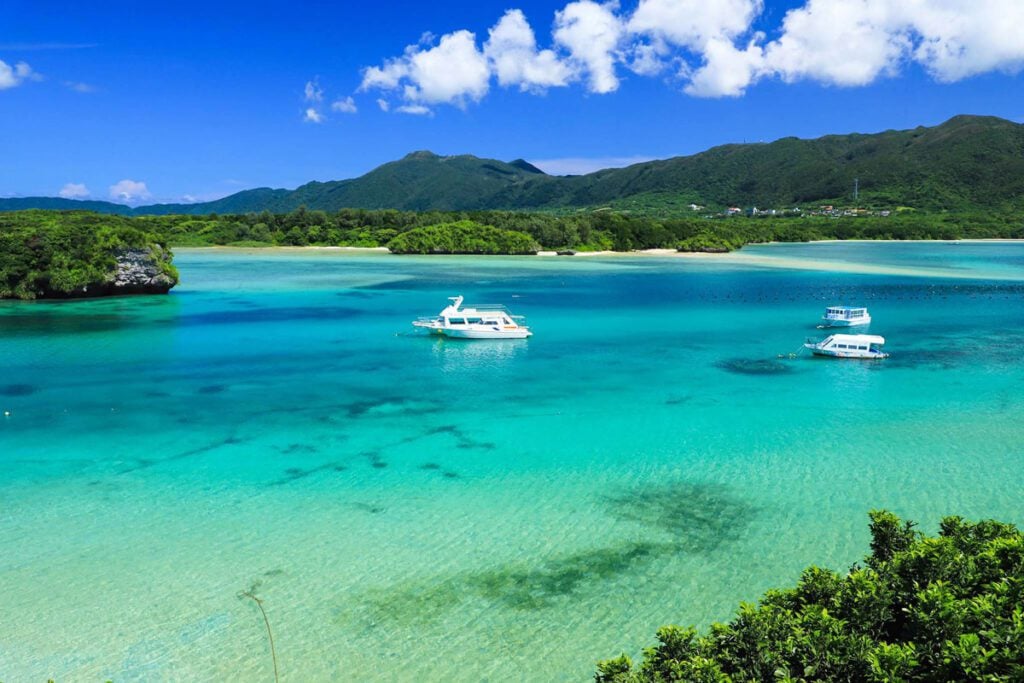
When you imagine relaxing on the sand with a fruity cocktail in hand, you probably think of places like Mexico , Hawaii , Thailand , or the Philippines .
But with about 34,000 km of coastline (~21,126 miles), you might want to consider Japan for your next beach vacation!
Here are some beach destinations in Japan to put on your radar:
- Okinawa : powdery white sand beaches and premier scuba diving in some of the clearest waters in the world
- Kamakura : sand and surf with Mount Fuji views, accessible as a day trip from Tokyo
- Wakayama : fresh seafood and beautiful beaches you can visit on a day trip from Osaka
6. Catch a baseball game at the Tokyo Dome

America’s favorite pastime takes on a life of its own in Japan, and going to a baseball game is a totally different experience than you’d have in the US .
For one, you can bring in your own food and booze. Yep, that’s right!
The drawback for any drinks you bring is you have to open them upon entering the stadium, and the security guards will pour it into a cup for you. So it’s best to just bring one or two, and then purchase another, if you’re so inclined.
Another key difference between baseball games in Japan versus North America is the atmosphere. Games in Japan (especially for popular teams like Tokyo’s Yomiuri Giants!) get wild!
The atmosphere is more like a high stakes professional hockey game, with chants, yelling, boozing, cheerleaders, and fan sections .
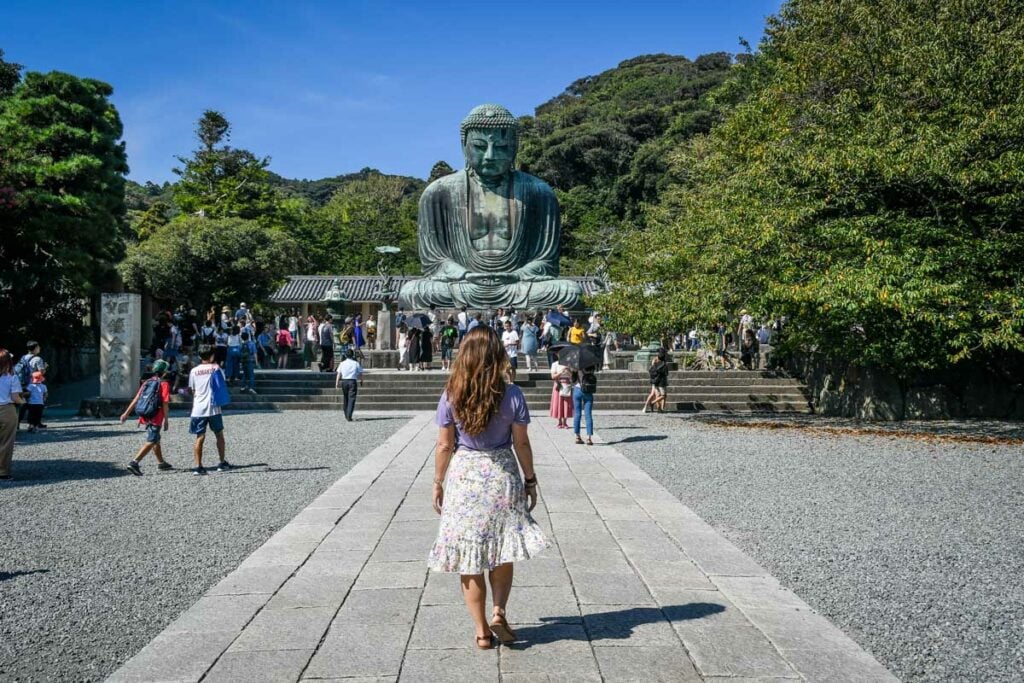
- Minoo Park : We visited this park on a day trip from Osaka one holiday weekend in August. Though it was busy with locals, we saw very few other foreigners.
- Hokkaido: Summer is the perfect time to explore Hokkaido’s breathtaking landscapes, including lavender fields in Furano and the Shikisai-no-Oka flower fields in Biei.
- Nagano: Enjoy the cool mountain air of Nagano in the summer, with outdoor activities like hiking, exploring the Matsumoto Castle, and experiencing the vibrant Obon festivals.
- Okinawa: With its tropical climate, Okinawa offers pristine beaches, clear waters, and vibrant coral reefs, making it an ideal summer destination for sunbathing and water activities.
- Ishigaki Island: Summer is ideal for exploring Ishigaki Island’s coral reefs, pristine beaches, and vibrant marine life, making it a paradise for snorkeling and diving enthusiasts.
- Kamakura: Home to the iconic Great Buddha statue, Kamakura is also a popular spot for surfing and makes a great day trip if you’re visiting Tokyo in the summer .
- Hitachi Seaside Park: Another popular getaway from Tokyo, this park’s summer blooms include sunflowers and zinnia, while the fluffy, rounded kochia bushes display a vivid lime green.
What to pack for Japan in summer
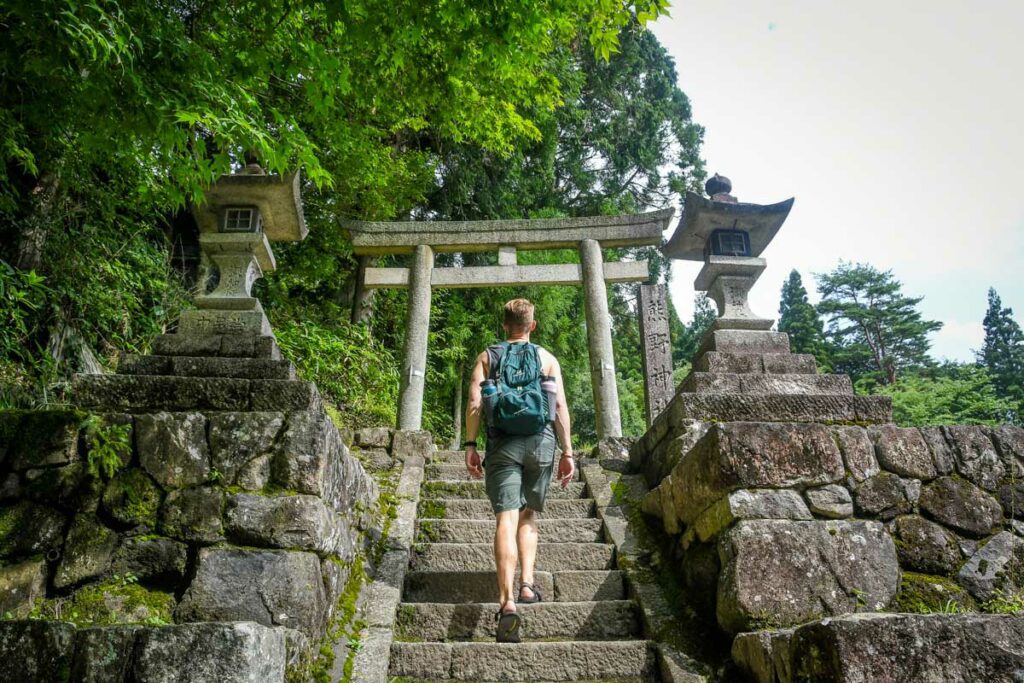
We have a guide where we break down exactly what to pack for summer in Japan (for both women and men!), but here are some essentials:
- Anti-chafing cream
- Hand-held fan (you can buy these all over and they make a nice Japanese souvenir )
- Deodorant – finding quality deodorant in Japan is very difficult (we switched to natural deodorant several years ago and will never go back!)
- Light, loose clothing that wicks sweat
- Umbrella for rain and shade
Hold up! We created a whole guide to all the things you need to pack for Japan . Plus, we even have a (totally free!) packing list you can download !
This FREE PDF download includes everything you’re going to want to pack for your Japan trip, including what NOT to bring, plus tons of insider tips!

Are you planning a trip to Japan?
We have TONS of resources on travel in Japan and destinations throughout the country. Check out our Ultimate Japan Travel Guide for all the answers to your most burning questions, or read some of our favorite articles below.
- Ultimate Japan Travel Guide for First-Timers
- Japan Rail Pass: Where to Buy a JRail Pass & Is it Worthwhile?
- Foods to Eat in Japan: Guide to Japanese Cuisine
- Japan Pocket Wifi vs. Japanese SIM card: Review & Comparison
- Best Japan Travel Apps
- Trip to Japan Cost + Tips for Budget Travel
- Essential Japan Travel Tips + Fun Facts
- Helpful Japanese Words & Phrases to Know for Traveling in Japan
Save this article on Pinterest for later!

We want to hear from you!
Have you ever been to Japan? What time of year did you visit? What was your experience like? Let us know in the comments below and we’ll do our best to get back to you!
Leave a Reply Cancel reply
Your email address will not be published. Required fields are marked *
Save my name, email, and website in this browser for the next time I comment.
The most valuable Japanese shopping information for you!
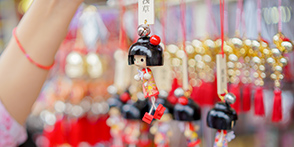
Attractive points of shopping in Japan

- Shopping reports
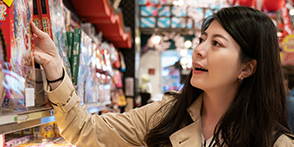
Basic shopping knowledge

- Coupons / benefits

- Sales / Events
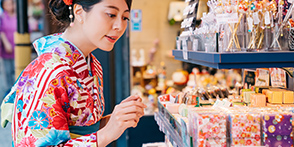
Shopping experience
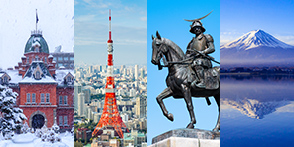
Featured area collections

Popular campaigns and collections

Japan Shopping Festival
- Experiences
- Department store
- Shopping mall
- Outlet mall
- Shopping arcade / underground shopping center
- Supermarket
- Convenience store
- Discount store
- 100 yen shop
- Luxury brand
- Airport concession
- Rest area / roadside station
- Pharmacy / Drugstore
- Electronics store
- Souvenir and local product shop
- Liquor store
- Clothes store
- Baby and kids product store
- Cosmetic store
- Accessory and jewelry store
- Car and bike supply store
- Character goods store
- Traditional craft store
- Art and music store
- Ticket shop
- Amusement park
- Restaurant / café
- Other kinds of shops
Facility services
- Credit card
- Smartphone payment
- Foreign currency / ATM
- Multilingual service
- Shipping service
- Muslim-friendly
- Vegan and vegetarian friendly
- Barrier-free
- Parking lot
- Medicine / Sanitation / Daily products
- Living room supplies / furniture
- Men's clothes / Accessories / Bags
- Women's clothes / Accessories / Bags
- Baby and kids products
- Electronic and digital devices
- Accessories / Jewelry
- Watches / Glasses
- Toys / Games
- Characters / Anime
- Books / Stationery
- Music / Video
- Sports / Outdoors
- Art / Traditional crafts
- Personal shopping
- Shopping support
- Food experiences
- Cultural experiences
- Outdoors / Activities
- Recommendations
- Japanese culture
- Food / Gourmet
- Products Search results
Summer Homework "Jiyu Kenkyu"
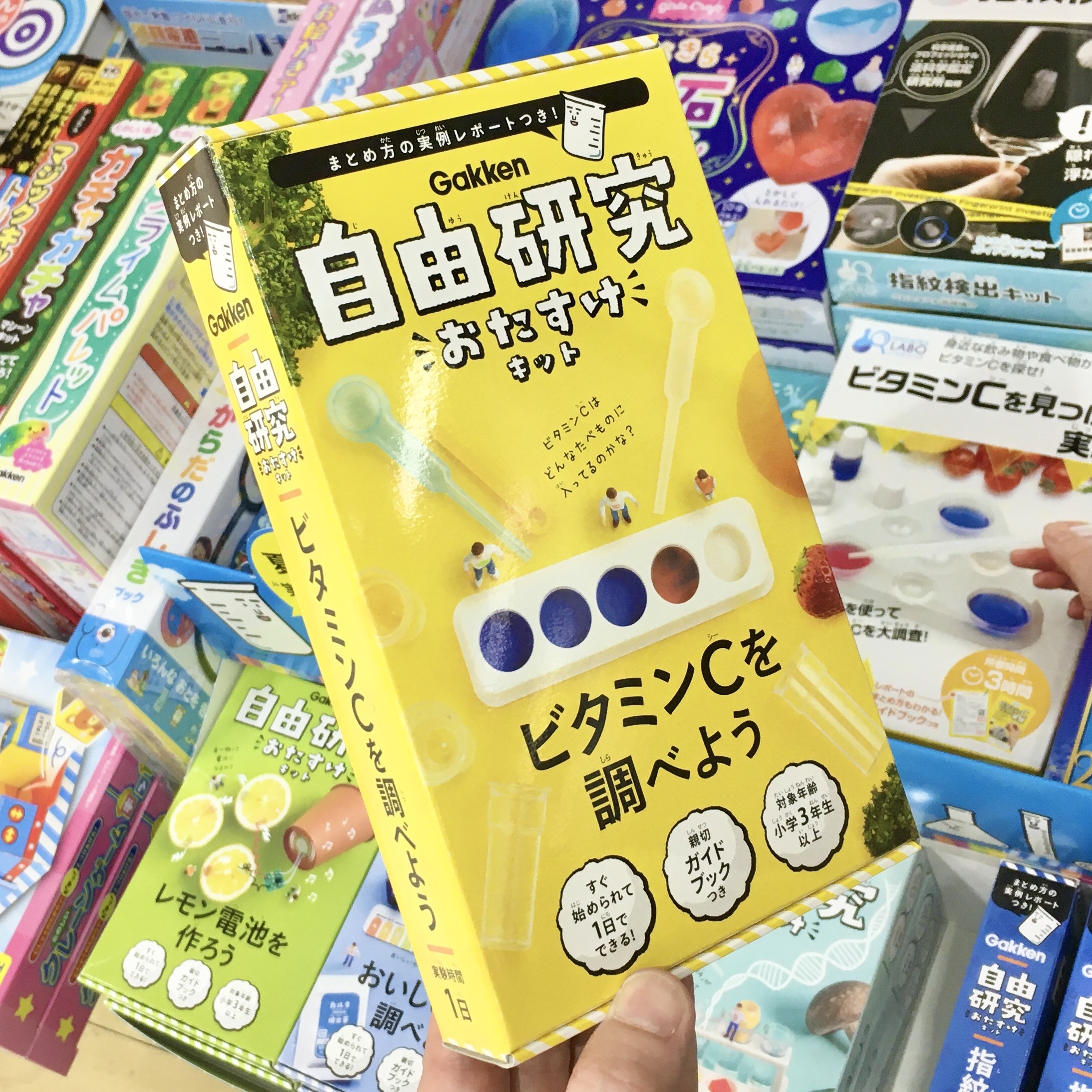
Summer vacation for Japanese elementary schools start from late July until end of August! Although it's a vacation, kids still have a lot of homework to do. The highlight of the homework is " Jiyu Kenkyu (自由研究) " or " free research ." However, some kids and parents get stuck on choosing a topic and proceeding the research. These " Jiyu Kenkyu Otasuke Kit (自由研究おたすけキット) " cover topics that kids might be interested in. They include kits necessary for research and instructions for writing experiment reports, helping out kids to carry on their free research!
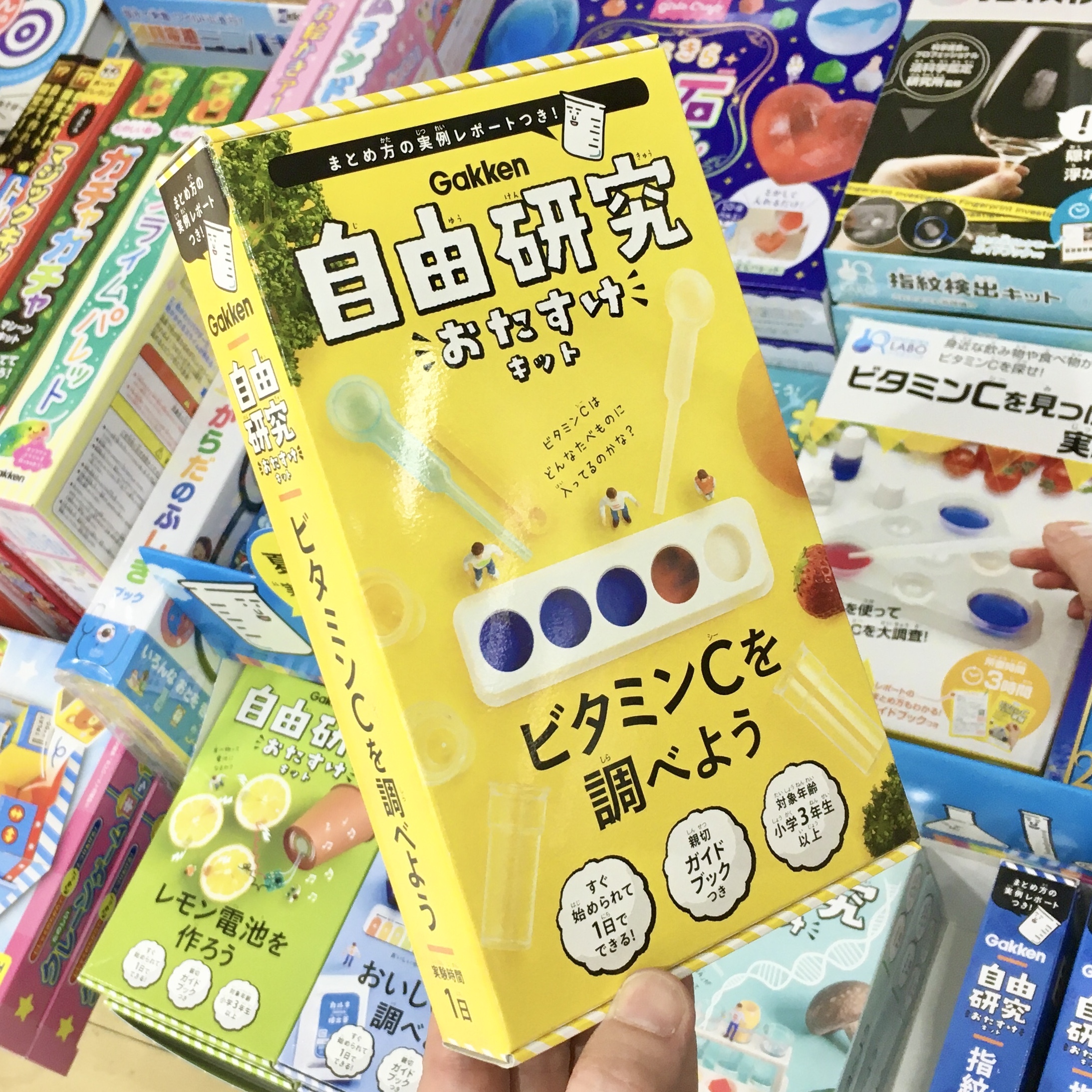
Let's research about Vitamin C You can research which food contains Vitamin C and compare the amount of Vitamin C contained in different food and drinks.
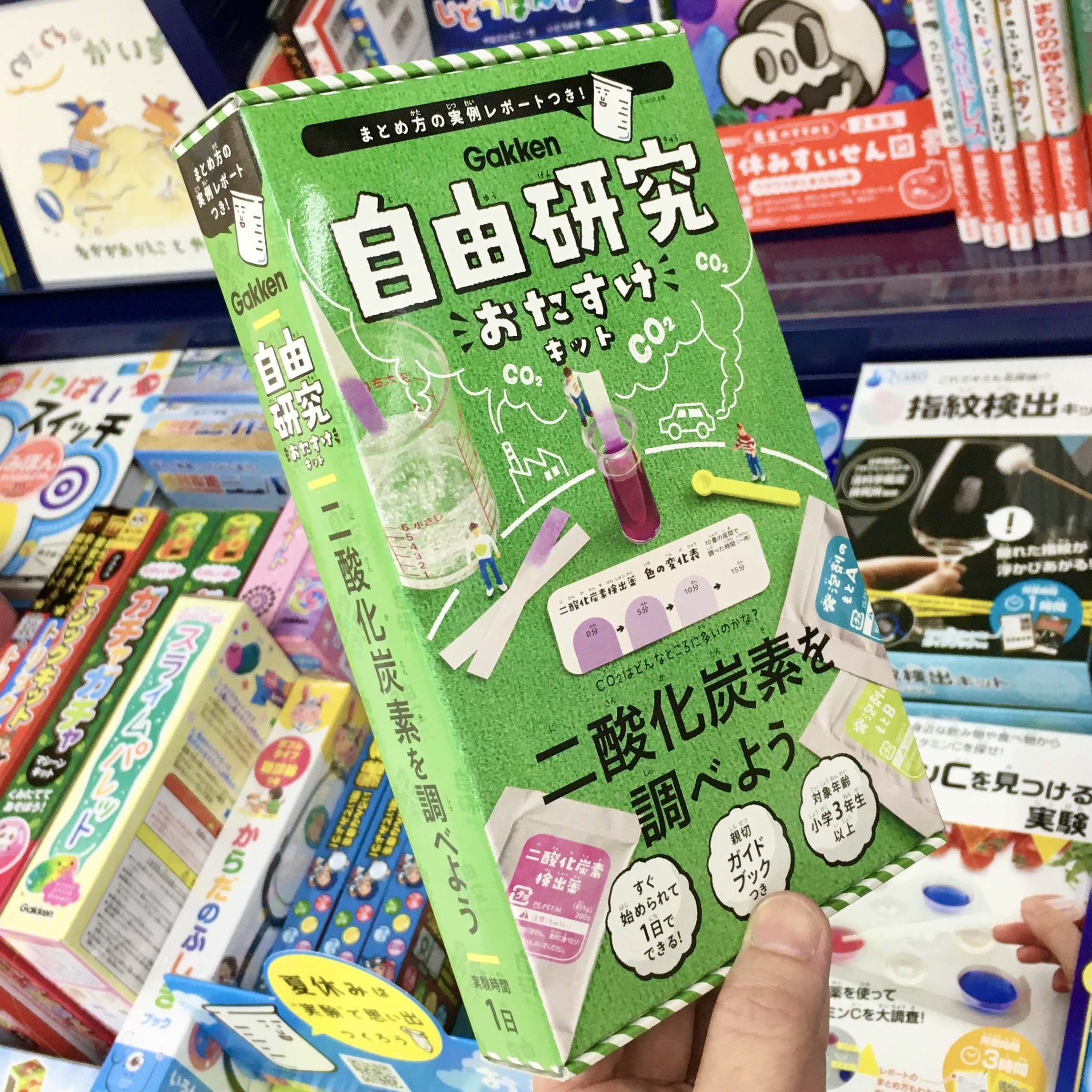
Let's research about CO2 You can research areas with high concentration of CO2 and also test that plants absorb CO2.
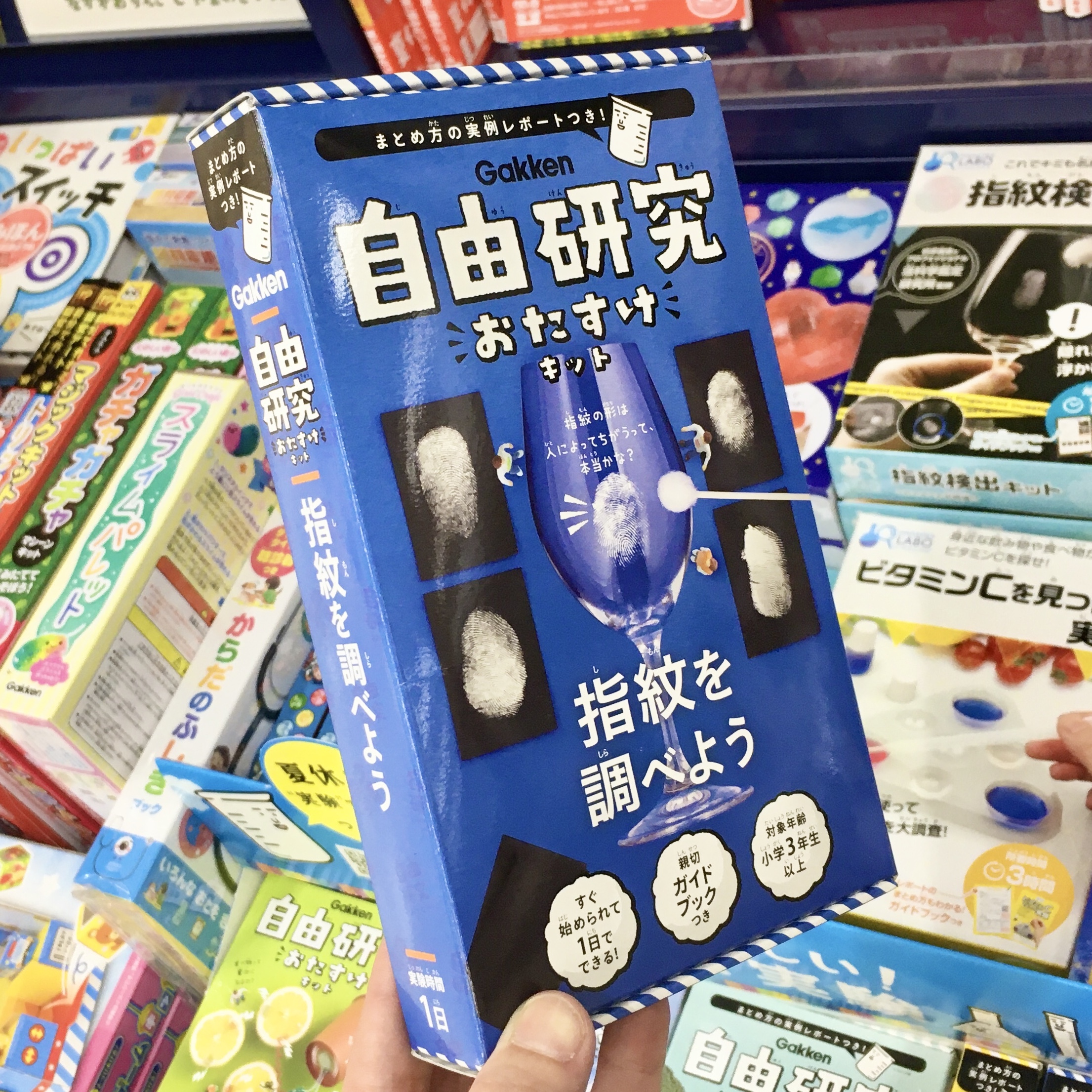
Let's research about fingerprints You can detect fingerprints on glass cups with aluminum powder, and determine the type of fingerprint. The attached guidebook will let you learn about forensic science.
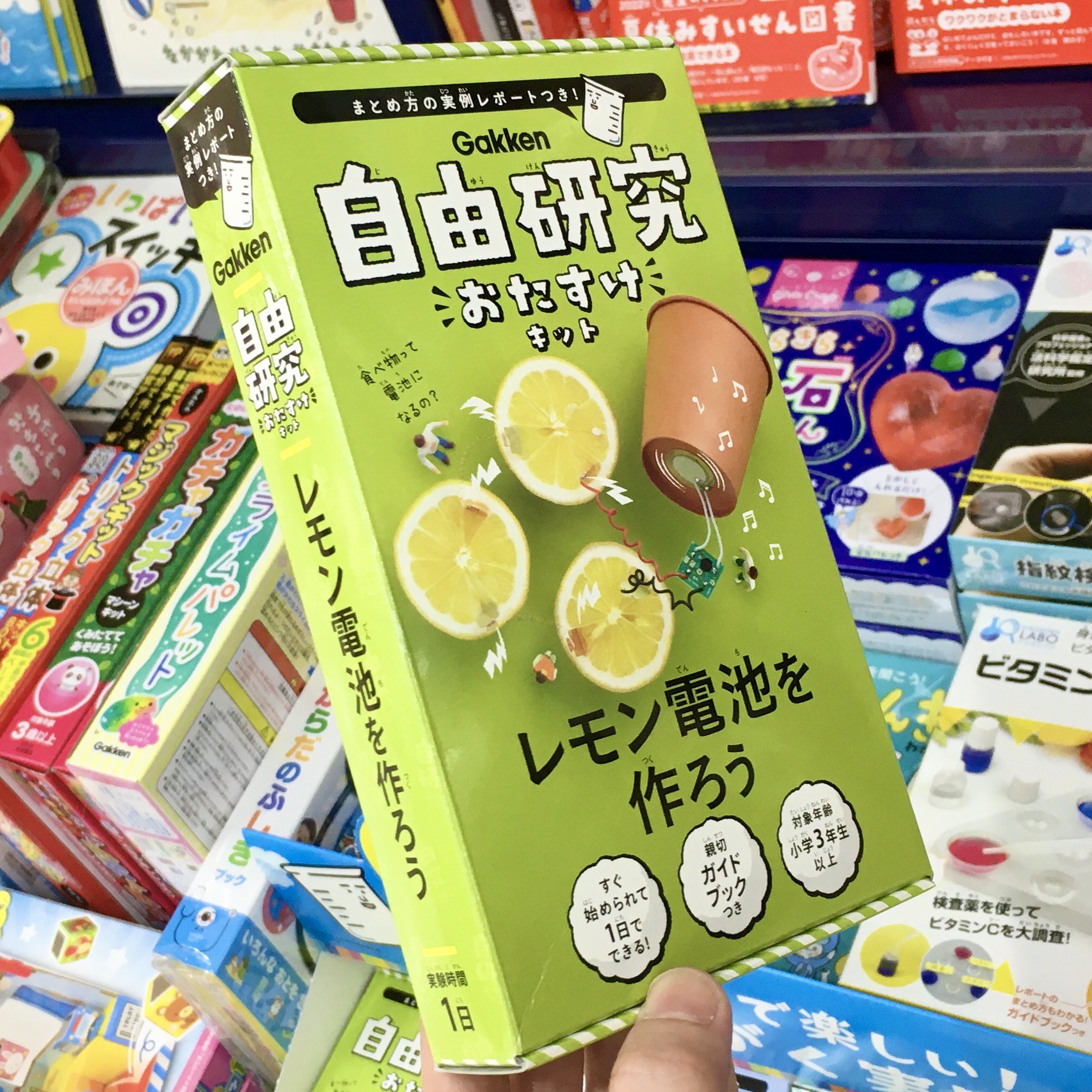
Let's make a lemon battery A kit to make a battery by inserting copper and zinc plates into a lemon. You can learn how electricity is created.
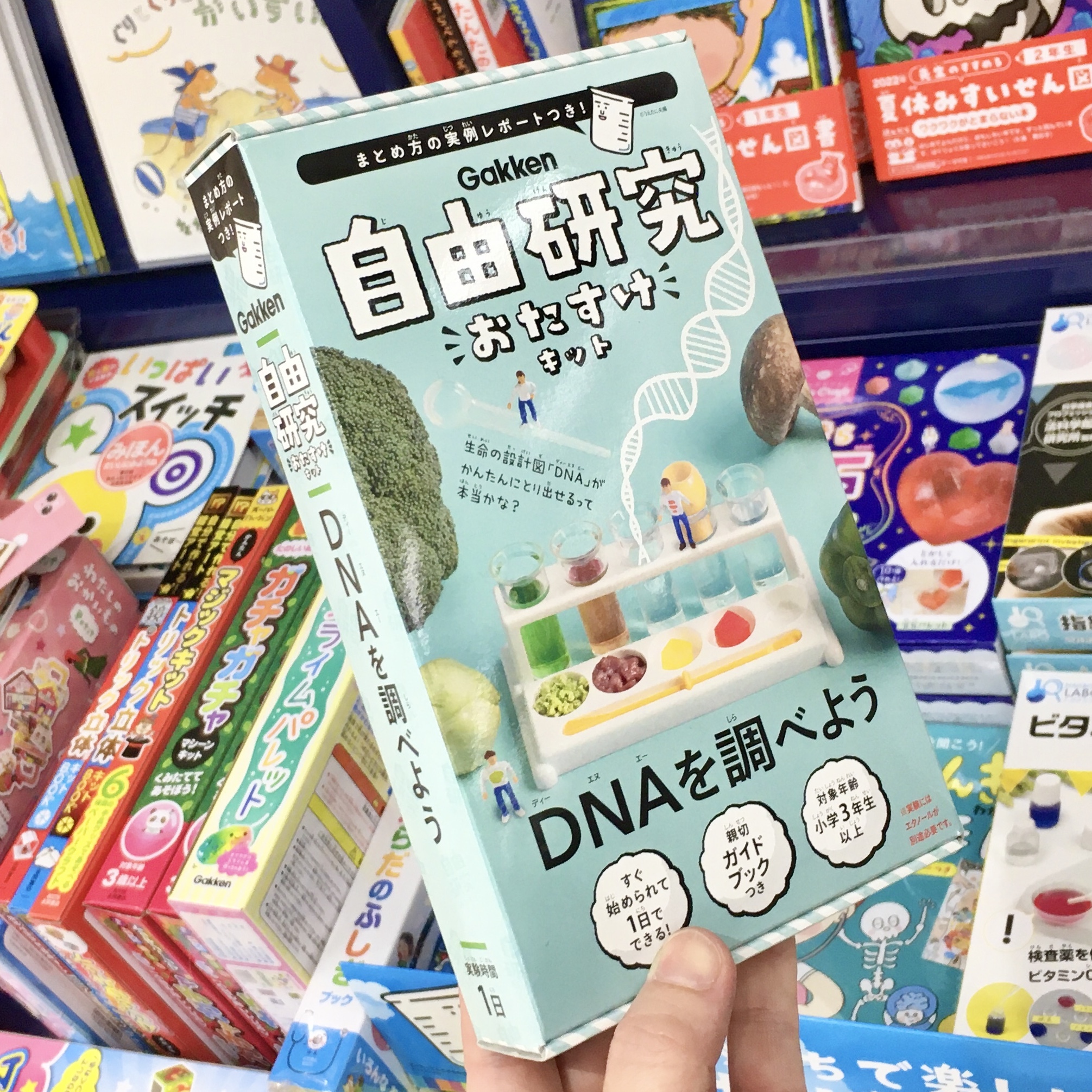
Let's research about DNA You can extract DNA from vegetables, meat, and even from cells of your own mouth, and research. The attached guidebook lets you learn about DNA and genes.
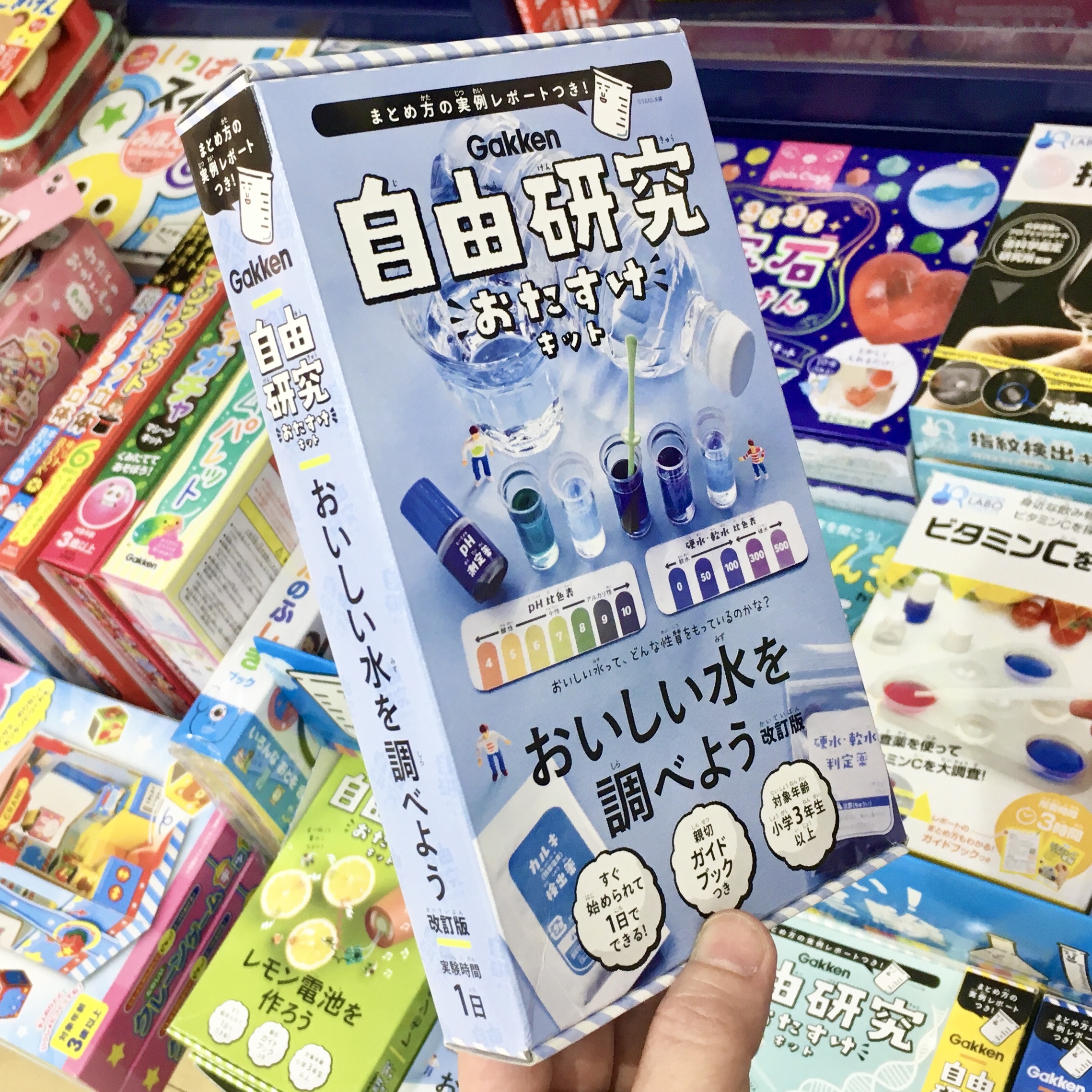
Let's research about delicious water You can learn how the properties of water affects its taste by examining the hardness and HP (degree of acidity/alkalinity) of drinking water. These topics are also interesting to adults too! Jiyu Kenkyu Otasuke Kit: 1,320 yen each *Recommended age range: 3rd Grade + 📍Maruzen Books Corner (7F)
Related products
Chibi Maruko-chan & Rascal POP UP SHOP
Kanto Tokyo
Keio Shinjuku Department Store
Spring-time Sweets
Strawberry Desserts
Made in Japan Eyeglasses: Line Art
New Year Sweets & Snacks
"Afternoon Tea LIVING" & "SPY×FAMILY" Collab Goods
Grand Seiko Fair
Christmas Sweets & Snacks
LUXURY NMN 15000
KYUKYODO's New Year Ornaments
Cute Hot Pots by Hidefumi Yamanaka
NEW SHOP "AXXZIA" OPEN
Mont Blanc season is here♬
[Seasonal Limit] Happy Halloween!
To all Harry Potter fans!
<Recommended Japanese Souvenir>Matcha Bowl
<Japanese Souvenir>Misato Asayama's Furoshiki
Be mesmerized by LLADRÓ's beautiful art♬
LUND LONDON's Adorable Drink Bottles
Pillow shopping at LOFTY
YA-MAN POP-UP SHOP open until late-AUG!
Welcome to the world of STAMPS!
Desserts from "Pâtisserie Ginza Sembikiya"
Funabashiya's Traditional Japanese Confectionery
Welcome to "The MAPLE MANIA"!
Easy Yukata for Kids
Kids' Jinbei from MIKI HOUSE★
Nambu Tekki Japanese Wind Chimes
Enjoy early summer scent with Hydrangea items♬
Cute Golf Wear from "M・U SPORTS"
Mother's Day Desserts@Keio Department Store
Spring shoe shopping in Tokyo♬
Adorable Baby & Kids Wear from familiar♬
“Children’s Day” in Japan
Sakura Confectionery, Cookies & Desserts
be Prime HOUSE OF ROSE Sakura Series are here!!♥
[Lladró] 70th Anniversary Collection
Strawberry season is here!!
New Year Treats
Tempura Specialist "Shinjuku Tsunahachi" (つな八)
What's "Kamameshi"? Drop by "Seigetsudo" to find out more!
Chestnut Dessert Heaven!
Kichiza's Delicious Tofu Dishes!
Enjoy Traditional Kyoto Cuisine at Minokichi☆
CURRY PARTY TIME♬
Calling all matcha fans! Take a break at saryo ITOEN ☆
Enjoying Tokyo-style sushi at Asahizushi!
Enjoy crispy tonkatsu at Saboen!
MELON! MELON! MELON!
Creating is FUN!!
KUZE FUKU's Addictive Snack Series♡
Purple Sweet Potato Snacks♡
Kitchenware that brings a summer vibe!
Eye-catching packages♡
Mizorekan (みぞれ羮)
Goldfish Manjyu
Summer cool desserts♡
"ICE RING"-Summer Life Savor!!
Savoring cool summer desserts!
Water resistant! Breathable! Slip-resistant! TOP DRY shoes!
Hydrangea Greeting Cards
Bath time with Amanatsu orange
Father's Day Gift Ideas
Tokoname Teapots
May is Shincha Season!!
\KINOKUNIYA's Spring Assorted Sweet Bean Buns/
M・U SPORTS|Cute Golf Goods♡
Hanazono Manjyu's Matcha Financier w/Sweet Beans♡
\Wagashi to celebrate Children's Day/
Keio Randoseru for Year 2023
\Strawberry Chocolates♡/
\Time for Strawberry Desserts!/
Custard Pudding meets Sweet Bean Paste♡
\Plump & Juicy!/
Celebrating YEAR 2022 with cute tigers♬
\Japanese Winter Fast Food!/
A small art! Christmas Jonamagashi☆
Japanese New Year's Item
Celebrating Christmas with Nisse☆彡
Herbarium LED Light from BOTANICA♡
Enjoying autumn foliage with greeting cards♪♬
Time for mont blanc cakes! Juchheim's classic mont blanc cake♡
Autumn in Japan is sweet! Ryoguchiya Korekiyo's "Miyama no Aki"
Sentaro's autumn confectionery is chestnut-centric!
Sinbashi Tamakiya's Kaiseki Chazuke
A drink in your pocket! POKETLE♡
Sachet Kit from Matsurica [Yamadamatsu Incense-wood]♡
”Yurukawaii" caramels from Hokkaido!
A sneak peek at Japan's good old days with "ADERIA RETRO" glass series♡
Time for MANGO!ANTÉNOR’s mango desserts♡
GLAMOURDISE's cute summer macarons!
What's TOKOROTEN?
STEAMCREAM HAKKA & ALOE LEMON
Sounds weird?! Delicious Japanese fruit sandwiches!
Morihachi's Kuzu Anmitsu♡
Manjyu turns into watermelon?! Eitaro's Watermelon Manjyu♡
Sweet salty mizu yokan from KINOKUNIYA♡
Treat for myself! Uji Matcha cheesecake♡
Love scrubbing your body? Refreshing with "Omiarai" wash cloth!
Fancy seafood inarizushi!♡
Cute summery goldfish jelly!♡
Natural beauty! Cheery bark tea caddy♡
Getting summery with Kingyokukan! Ryoguchiya Korekiyo's "Sawa no Midori"♡
Shiose Souhonke's Jonamagashi♡ Beautiful work of art!
Too cute to choose! Chopstick rest for a change♡
Big Japanese citrus turns into jelly! Sentaro's Kawachi Jukushi♡
Hello Kitty & Chikazawa Lace collab goodies♡
Looks like jeans but no quite! I tried Wacoal Kulson's "Marude Denim"
Start June with a parfait with a lot of fruits! ANTÉNOR's Fruits a la mode Parfait♡
Japanese Hot Pots from Tachikichi
MAiSEN's Cheese Menchi-katsu Sandwich

IMAGES
VIDEO
COMMENTS
The problem with jiyu kenkyu is that it is only one small but time-consuming part of the thick bundle of summer homework euphemistically called " natsu yasumi no tomo " ("summer break friend")—and boy, with friends like that…. It includes an 80-page workbook with drills covering each subject, extra printouts for kanji (Japanese ...
This article explores the issue of homework in Japan from a historical and modern perspective. It looks at how much homework Japanese students receive, what factors affect the amount of homework they receive, and the benefits and disadvantages of heavy homework loads for Japanese students. Additionally, it discusses the impact of technology on homework in Japan, with an emphasis on potential ...
The school year starts in April, so summer break is in the during the school year. Yes, there is homework.
A survey found that around half of Japanese children thought that there was a need for homework over the summer vacation, with the percentage slightly higher among junior high school students.
The traditional rite of summer homework has been squeezing the joy out of vacations since the modernization of Japan's school system in the late-19th century.
Japan Data. All Homework, No Play: Summer Vacation Tasks Pile Up for Japanese Elementary School Students Society Education Aug 19, 2022. There is no escape from homework during the summer vacation ...
With summer homework a staple for many Japanese children, are youngsters suffering from exhaustion and do their parents support the allocation of studies during vacation? Subscribe .
For elementary school children in Japan, their weeks-long summer vacation isn't entirely a time for leisure. Instead, it's overshadowed by a stack of homework that features, among other things, an ...
While the rest of the free world is rightfully discussing the abolishment of the unproven concept of homework, in Japan students even get assignments over the holidays. So, her first summer vacation was spent watering, trimming and spraying her asagao while recording the process; daily reading aloud from her textbook; preparing a presentation ...
In Japan, as in the U.S., summer vacation is a time to have fun and enjoy the warm weather, spend time with friends and family, or go on vacation; but, unlike in the U.S., where students usually get two to three months of vacation time, Japanese students generally only receive five weeks off from school. In addition to having less time off ...
As kids head back to school, sighs of parental relief can be heard all across Japan. If your kids are in international school, they are probably excited about starting a brand new term. But if they are in a Japanese school, however, you sent them back for the second term with the pile of homework that schools assign over summer break.
The following is a typical scene that many families in Japan will have recently experienced, and probably not for the first time: It's August 31, the last day of summer vacation and the fall semester is starting in less than 24 hours. The kids who played all month suddenly realize that they have to do 40 pages of kanji and math drills, write a book report for a book they haven't read, and ...
New Japanese luxury bus tour seats only 10 passengers, tickets cost over US$1,200 each; 57-year-old man acquires diver's license to search for wife lost in tsunami; Anime's rudest little boy, Crayon Shin-chan, helps pledge support for hardworking moms "Hate summer homework, kids? We'll do it for you!" A disturbingly booming business ...
Nifty Corporation asked just under 1,400 elementary and junior high school students in Japan about summer vacation — and found that a total of 49% thought that summer homework was "necessary" or "somewhat necessary." However, while just 47% of elementary students thought summer homework was "necessary" or "somewhat necessary," that figure ...
Unfortunately, in some countries, summer vacation also means summer homework. Nifty Corporation asked just under 1,400 elementary and junior high school students in Japan about summer vacation — and found that a total of 49% thought that summer homework was "necessary" or "somewhat necessary."
Most elementary, middle and high schools in Japan have about 40 days of summer breaks, usually from July 20 to August 31. ... Homework during breaks. kids are given home works to do during breaks. It will be either a work book on several subjects or tens of handout made by the teacher.
In Japan, summer vacation for students is for about 30-40 days however, children / students have an obligation to finish a lot of homework. For example, math and kanji (Chinese character) drills, a book report, keeping a journal during the entire summer vacation, a painting, practicing some musical instruments like melodica, an observation ...
Japan has long been notorious for its super-short summer vacations. But just in case kids still have a little too much unstructured time on their hands, the school provided a big brown envelope ...
Duration of Summer Break. Summer break in Japan typically lasts for around six weeks, from late July to early September. The exact dates can vary depending on the region and school, but most schools follow a similar schedule. During this time, students are free from their regular classes and have the opportunity to pursue other interests.
Fireworks were once used to scare away evil spirits, and today there are a number of summer hanabi (fireworks displays) to enjoy around Japan so I've listed a few below. Check if one will coincide with your trip! Sumida River Fireworks Festival. Edogawa Fireworks Festival. Kamakura Fireworks Festival.
For elementary school children in Japan, their weeks-long summer vacation isn't entirely a time for leisure. Instead, it's overshadowed by a stack of homework that features, among other things, an ...
The best part is that summer temperatures high in the mountains are much more comfortable than in the lower-altitude cities. You can complete the entire route in one day, but if you have extra time (and money) you can stay at the highest hotel in Japan, Hotel Tateyama . 4. Dive into an underwater paradise.
2022-08-20. Summer vacation for Japanese elementary schools start from late July until end of August! Although it's a vacation, kids still have a lot of homework to do. The highlight of the homework is " Jiyu Kenkyu (自由研究) " or " free research ." However, some kids and parents get stuck on choosing a topic and proceeding the research.